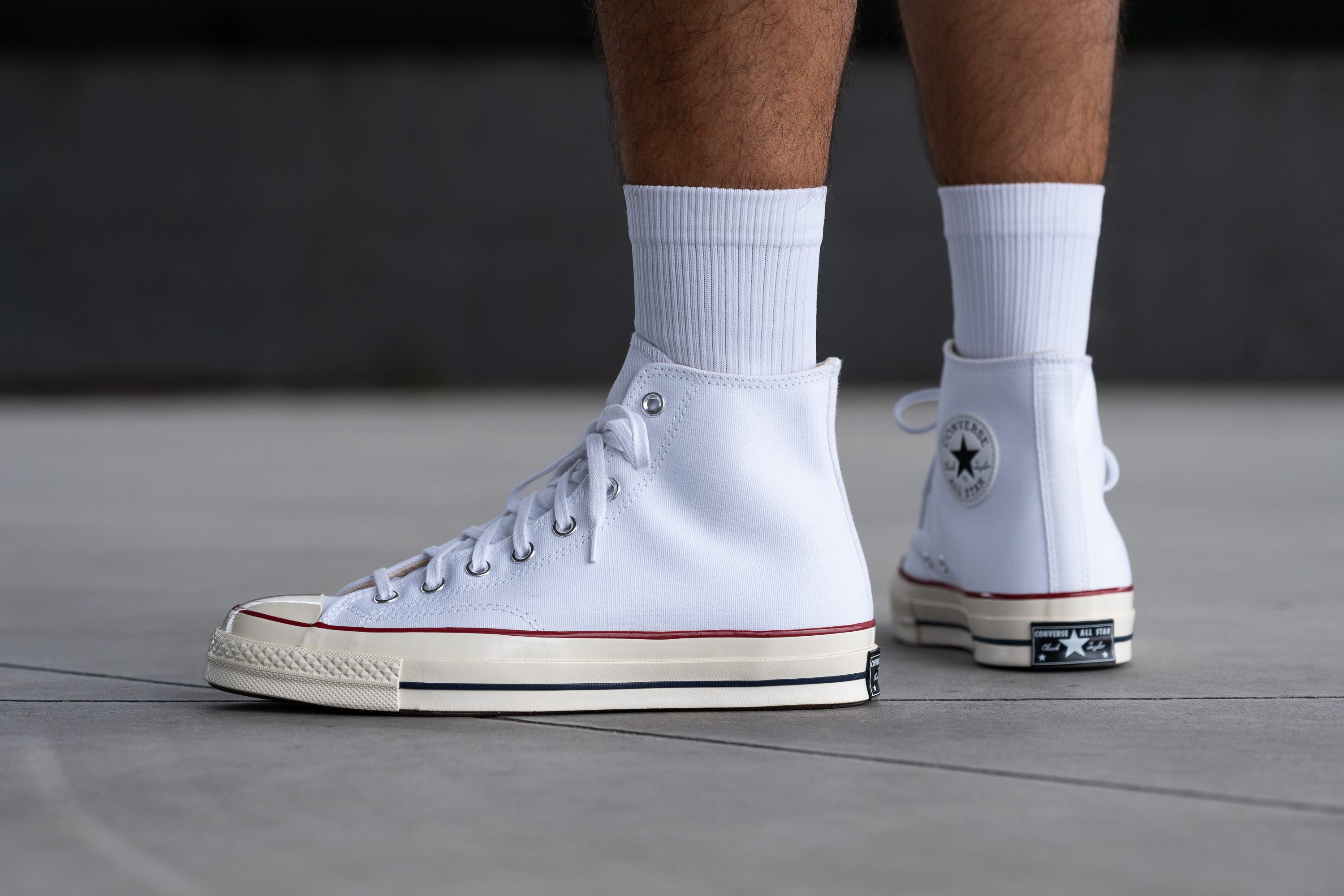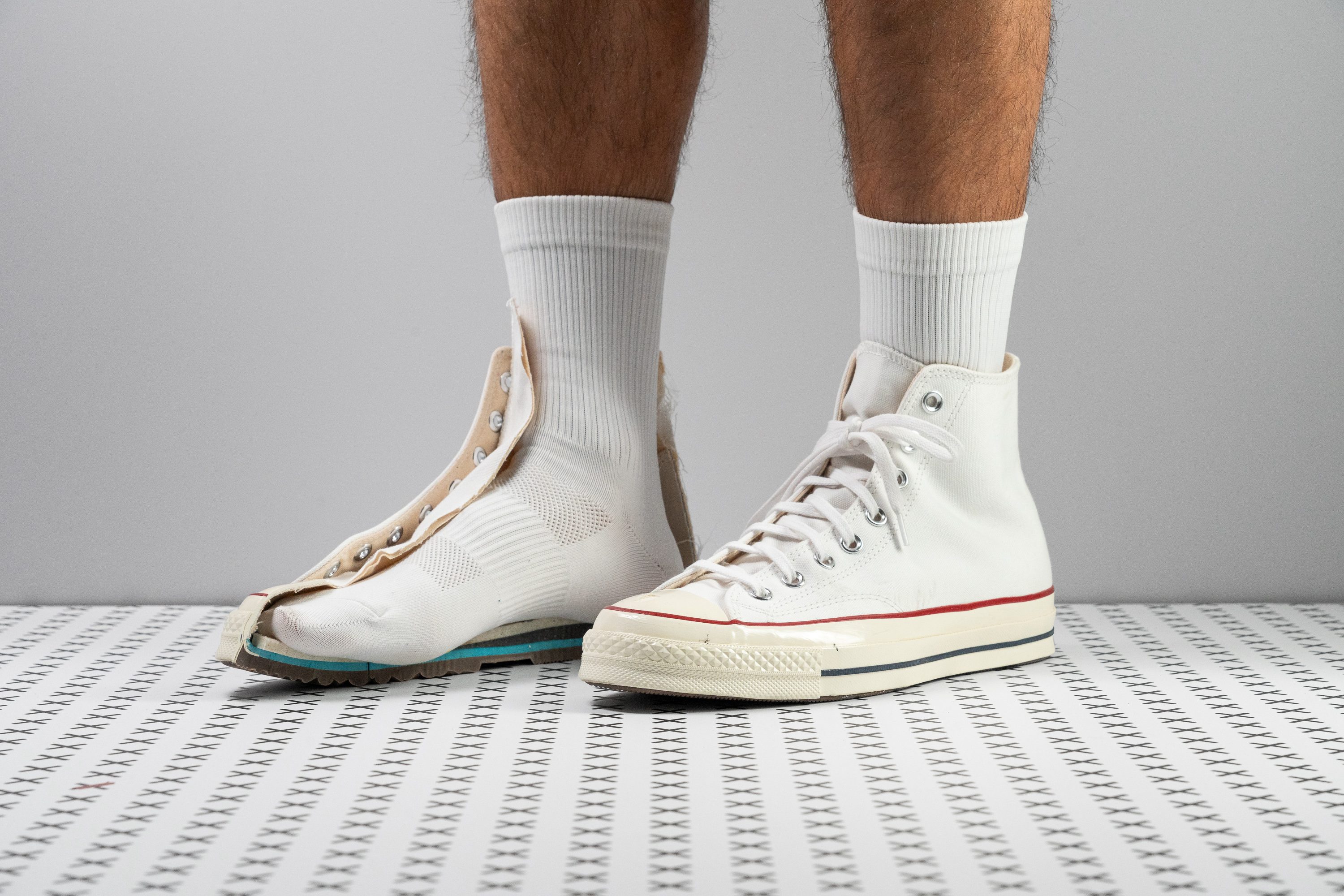Our verdict
- Top pick in best basketball sneakers
- Top pick in best high top sneakers
Pros
- Ever-popular, iconic silhouette
- Versatile for any outfit and occasion
- Highly durable construction
- Light for a high-top sneaker
- Grounded platform
- Surprisingly flexible
- Affordable price point
- Great grip for wet and dry situations
Cons
- Not breathable
- No arch support
- Very narrow profile
Audience verdict
Comparison
The most similar sneakers compared
+ + Add a shoe | |||||
|---|---|---|---|---|---|
| Audience score | 92 Great! | 95 Superb! | 93 Great! | 90 Good! | |
| Price | $90 | $160 | $150 | $130 | |
| Style | ClassicRetroSportyMinimalist | RetroSporty | RetroSporty | ClassicRetroSporty | |
| Shock absorption | Low | - | - | - | |
| Energy return | Low | - | - | - | |
| Traction | High | - | - | - | |
| Breathability | Warm | Warm | Moderate | Moderate | |
| Weight lab | 17 oz / 482g | 17.7 oz / 502g | 15.8 oz / 449g | 14.4 oz / 407g | |
| Size | Slightly large | True to size | True to size | True to size | |
| Midsole softness | Balanced | Firm | Firm | Firm | |
| Material | CanvasVulc Sole | Leather | LeatherMesh | Cup SoleLeather | |
| Season | SpringFall | Winter | SpringFall | SpringFall | |
| Inspired from | Basketball | Basketball | Basketball | Basketball | |
| Width / fit | Medium | Medium | Medium | Narrow | |
| Toebox width | Narrow | Medium | Medium | Medium | |
| Leather/suede quality | - | Real leather | - | Real leather | |
| Toebox durability | Decent | Bad | Decent | Decent | |
| Heel padding durability | Bad | Bad | Decent | Decent | |
| Outsole durability | Decent | Bad | Decent | Good | |
| Heel stack lab | 26.2 mm | 29.4 mm | 27.1 mm | 22.6 mm | |
| Stiffness | Flexible | Stiff | Stiff | Stiff | |
| Tongue padding | Very thin | Thin | Average | Average | |
| Drop lab | 8.6 mm | 10.8 mm | 7.1 mm | 7.7 mm | |
| Forefoot | 17.6 mm | 18.6 mm | 20.0 mm | 14.9 mm | |
| Removable insole | ✓ | ✓ | ✓ | ✓ | |
| Heel tab | None | Finger loop | Finger loop | Pull tab | |
| Torsional rigidity | Flexible | Stiff | Stiff | Moderate | |
| Heel counter stiffness | Flexible | Stiff | Moderate | Moderate | |
| Closure | Laces | Laces | Laces | Laces | |
| Top | High top | High top | High top | High top | |
| Ranking | #42 Top 35% | #9 Top 8% | #22 Top 19% | #67 Bottom 44% | |
| Popularity | #87 Bottom 28% | #32 Top 27% | #75 Bottom 38% | #59 Top 49% |
Who should buy
In our opinion, it is impossible to go wrong with the Converse Chuck 70 High if you want:
- a high-top sneaker that can be styled with nearly every outfit
- a go-to-pair that fits into any occasion, from a music concert to a wedding
- an affordable and very cost-effective sneaker for only $90
- a more reinforced version of the Chuck Taylor All Star ($65): thicker canvas, taller rubber sidewalls, etc.
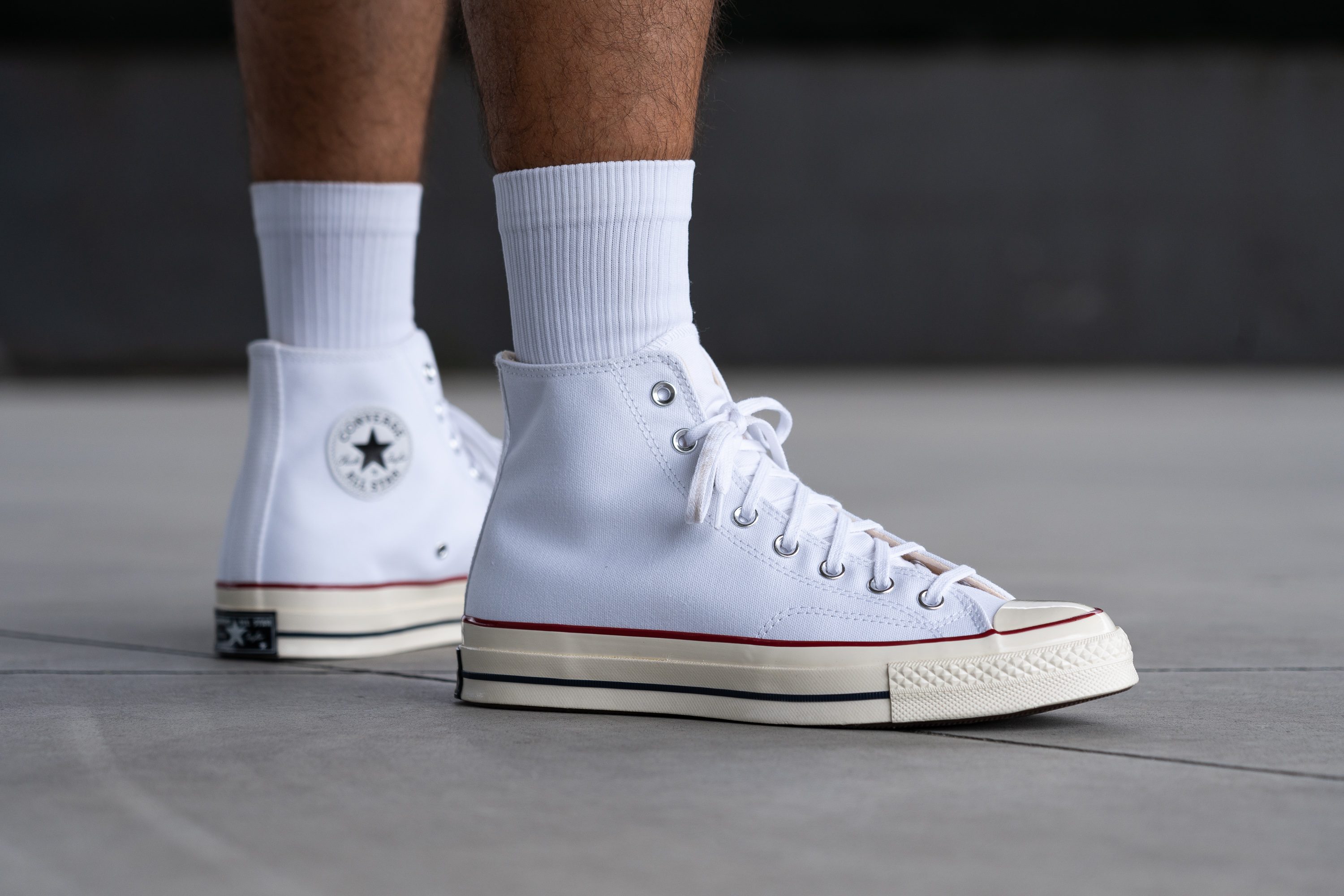
Who should NOT buy
Style-wise, we have zero gripes about the Chucky But when it comes to day-to-day comfort and support, we just cannot recommend this Converse kick for prolonged wear.
A better alternative would be the Converse Run Star Hike as long as you don't mind the platform. This high-top sneaker offers much better cushioning and support for daily walks.
Among other classic sneakers, we found that the Air Jordan 1 Mid is a solid option for spending hours on your feet.
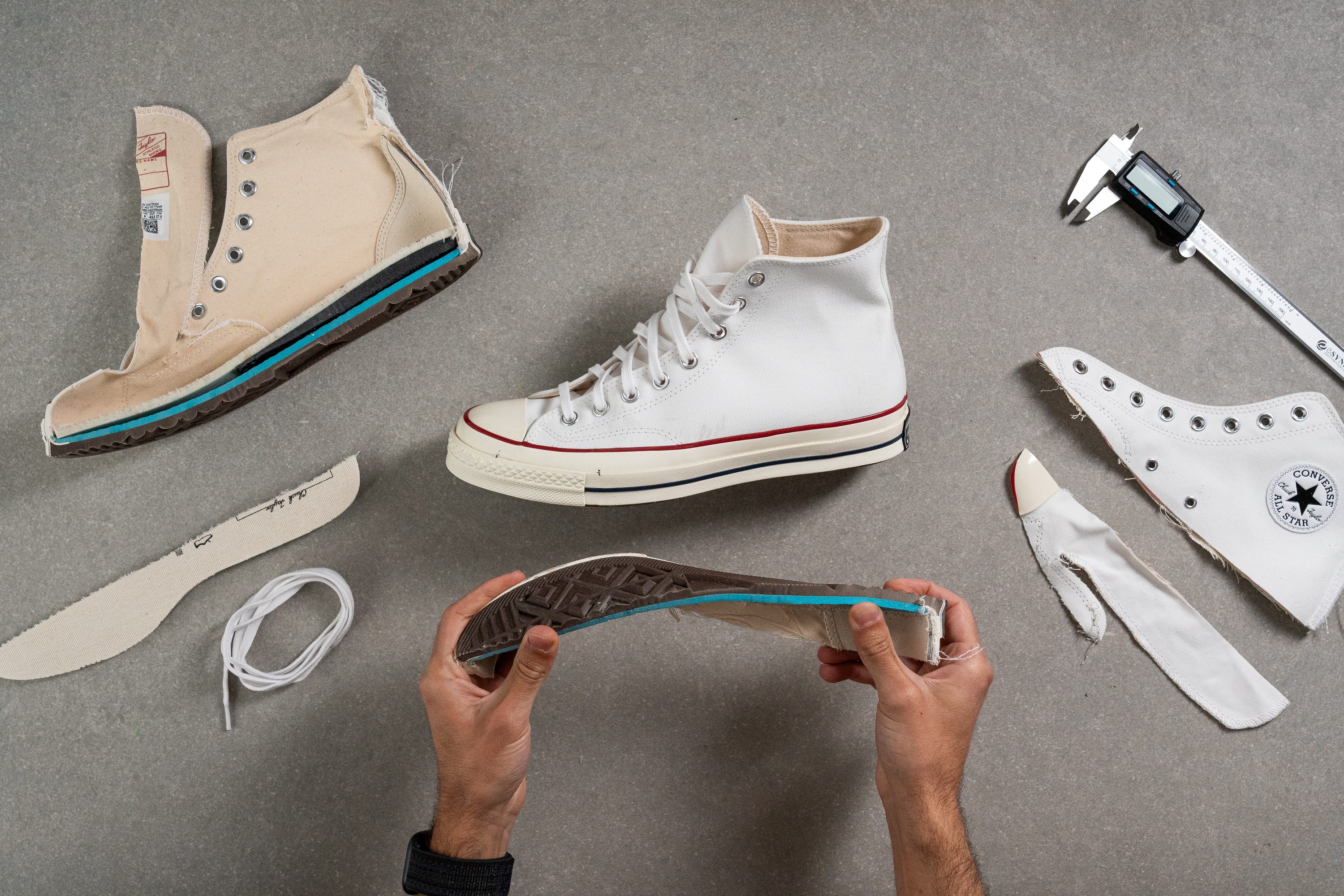
Cushioning
Shock absorption
Don't expect much impact protection for the Chuck 70, as about two-thirds of the shoe's platform is made of hard rubber and firm foam. The shock absorption here is minimal, showing only 66 SA in our tests.
It is a very grounded, minimal, and planted base, which is the complete opposite of well-cushioned sneakers.
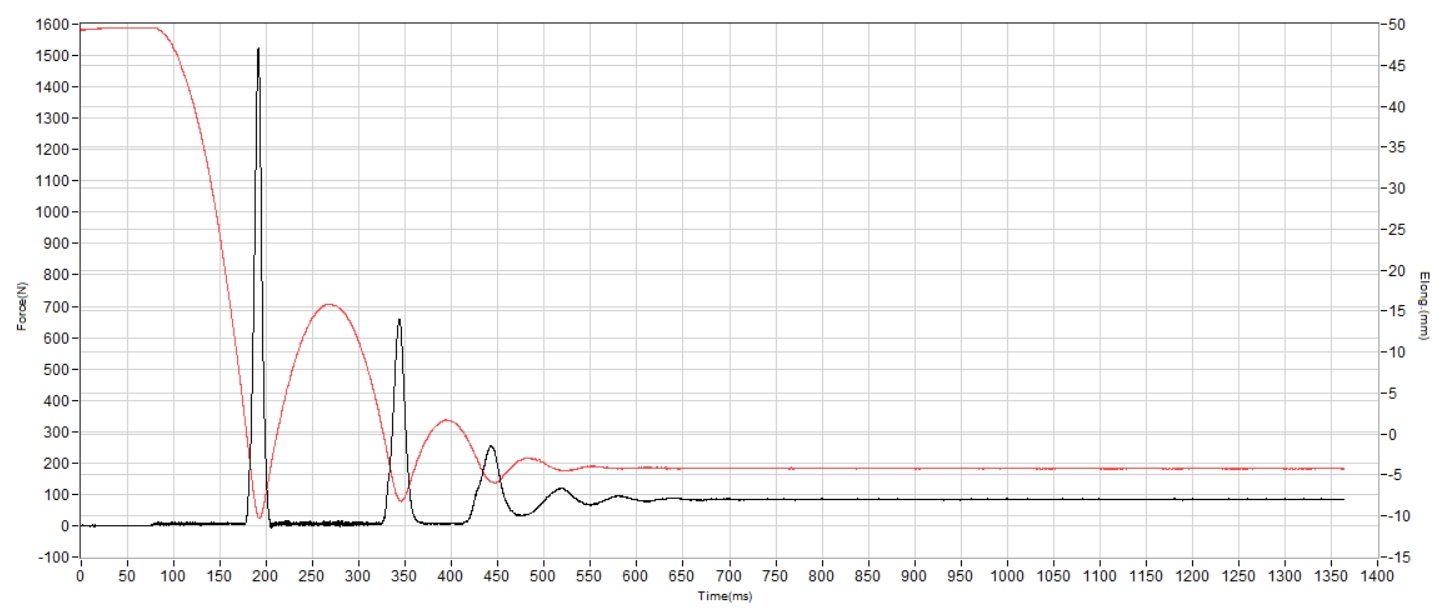
| Chuck 70 High Top | 66 SA |
| Average | 89 SA |
Energy return
With some of the lowest energy return measurements of 40%, the ride of this Converse sneaker feels pretty flat and static. No bounce to be expected.
| Chuck 70 High Top | 40.1% |
| Average | 50.2% |
Heel stack
With a moderate heel stack of 26.2 mm, the Converse Chuck 70 offers a very grounded underfoot experience.
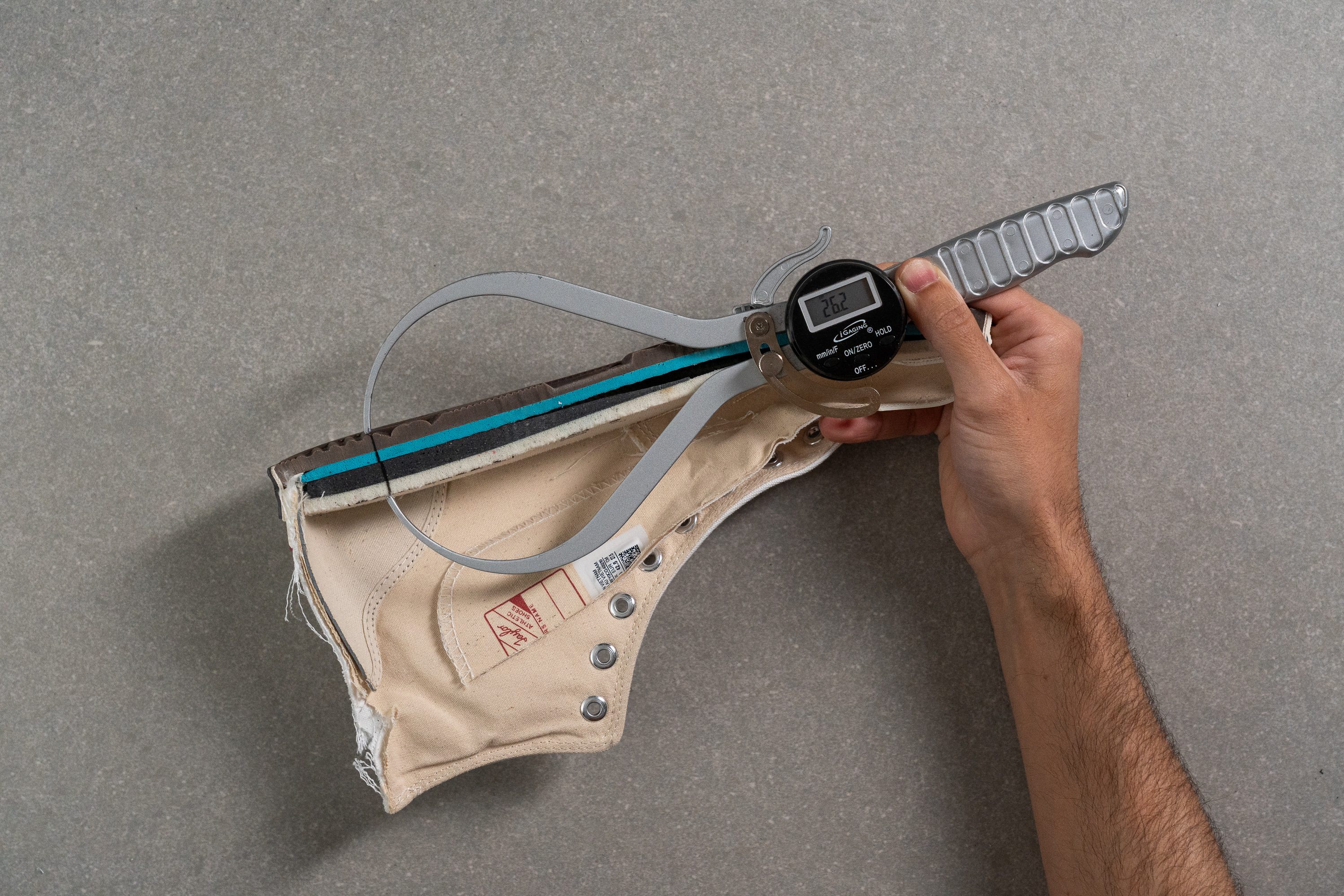
| Chuck 70 High Top | 26.2 mm |
| Average | 30.7 mm |
Forefoot stack
This Converse sneaker also felt very close to the ground under the balls of our feet. Stepping on pebbles, bottle caps, and other urban debris certainly didn't go unnoticed.
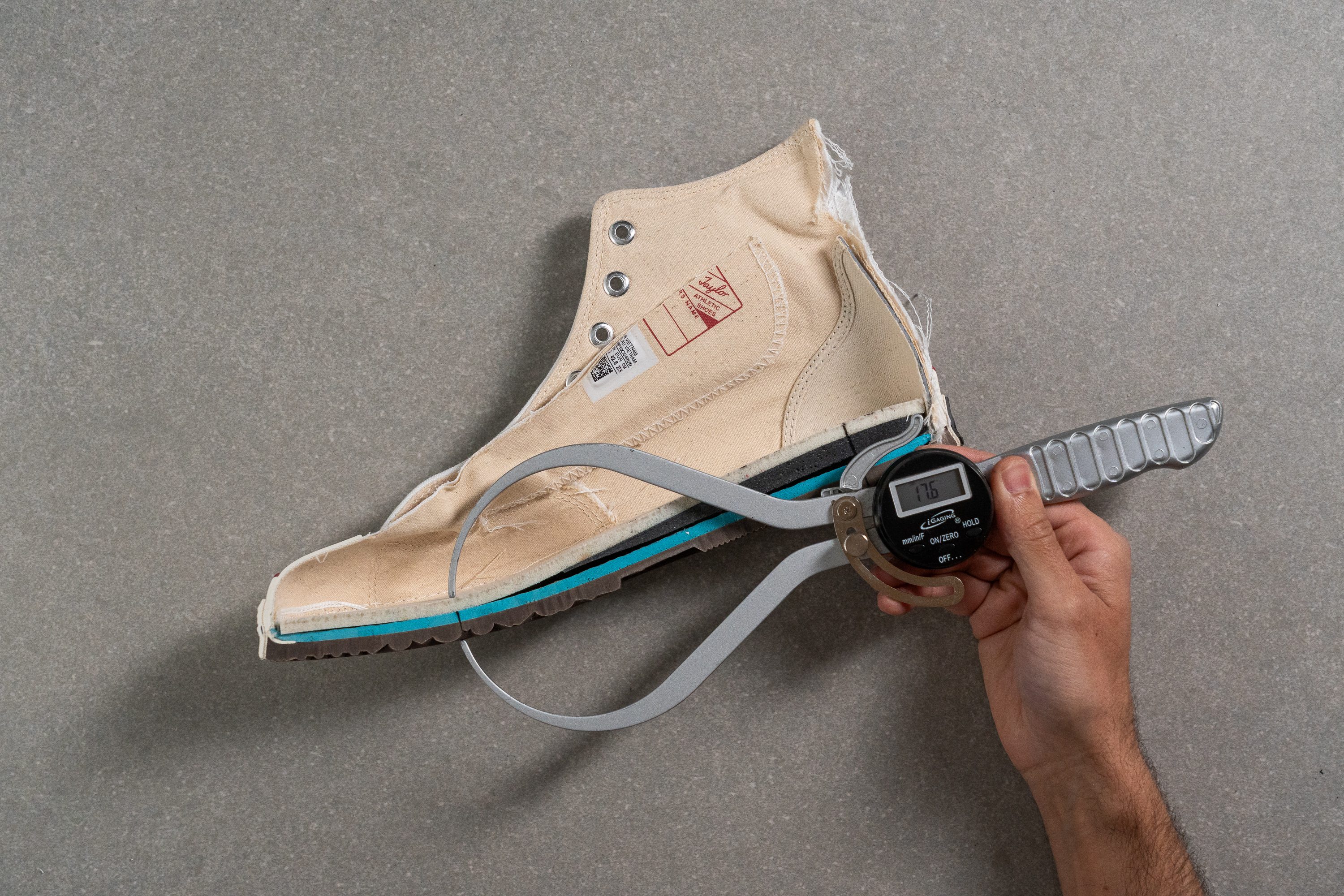
Based on our caliper measurement, the shoe's forefoot stack is only 17.6 mm thick which backs up our personal experience.
| Chuck 70 High Top | 17.6 mm |
| Average | 19.5 mm |
Drop
The heel-to-toe difference inside the Chuck 70 comes in at a moderate 8.6 mm, a little lower than average.
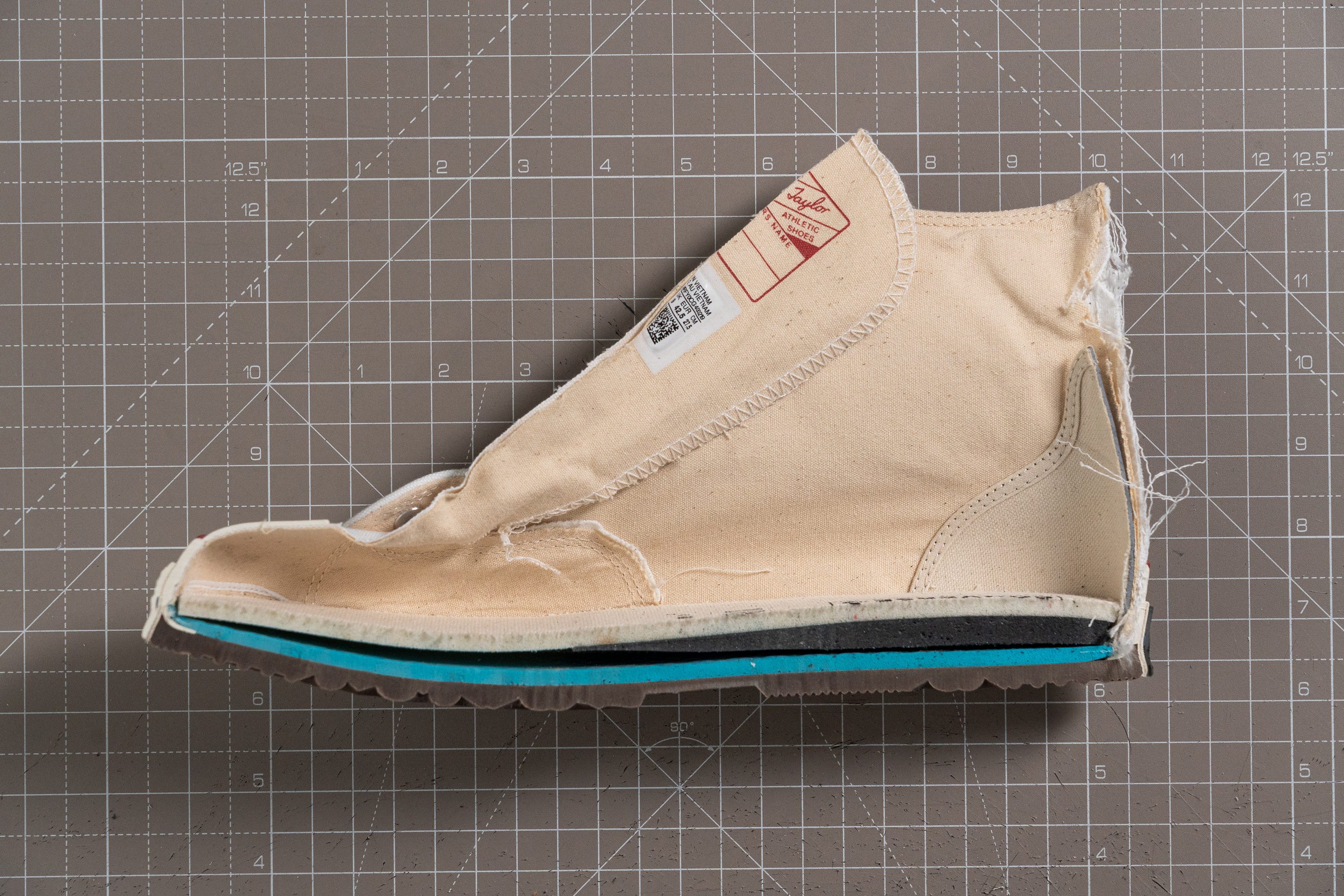
But it's hard to notice unless you have worn dozens of sneakers with different drops.
| Chuck 70 High Top | 8.6 mm |
| Average | 11.2 mm |
Midsole softness
If we tell you that the Converse Chuck 70 is not a plush sneaker, we are probably not breaking the news.
For the most part, this is due to the shoe's hard vulcanized outsole paired with a tall rubberized overlay.
But on top of that, the shoe's midsole layer (the blue one) is not very soft either. Pressing our durometer against it, we got a reading of 25.1 HA. It is not as hard as the average sneaker but still firmer than popular shoes like the Nike Air Force 1 07 and the New Balance 9060.
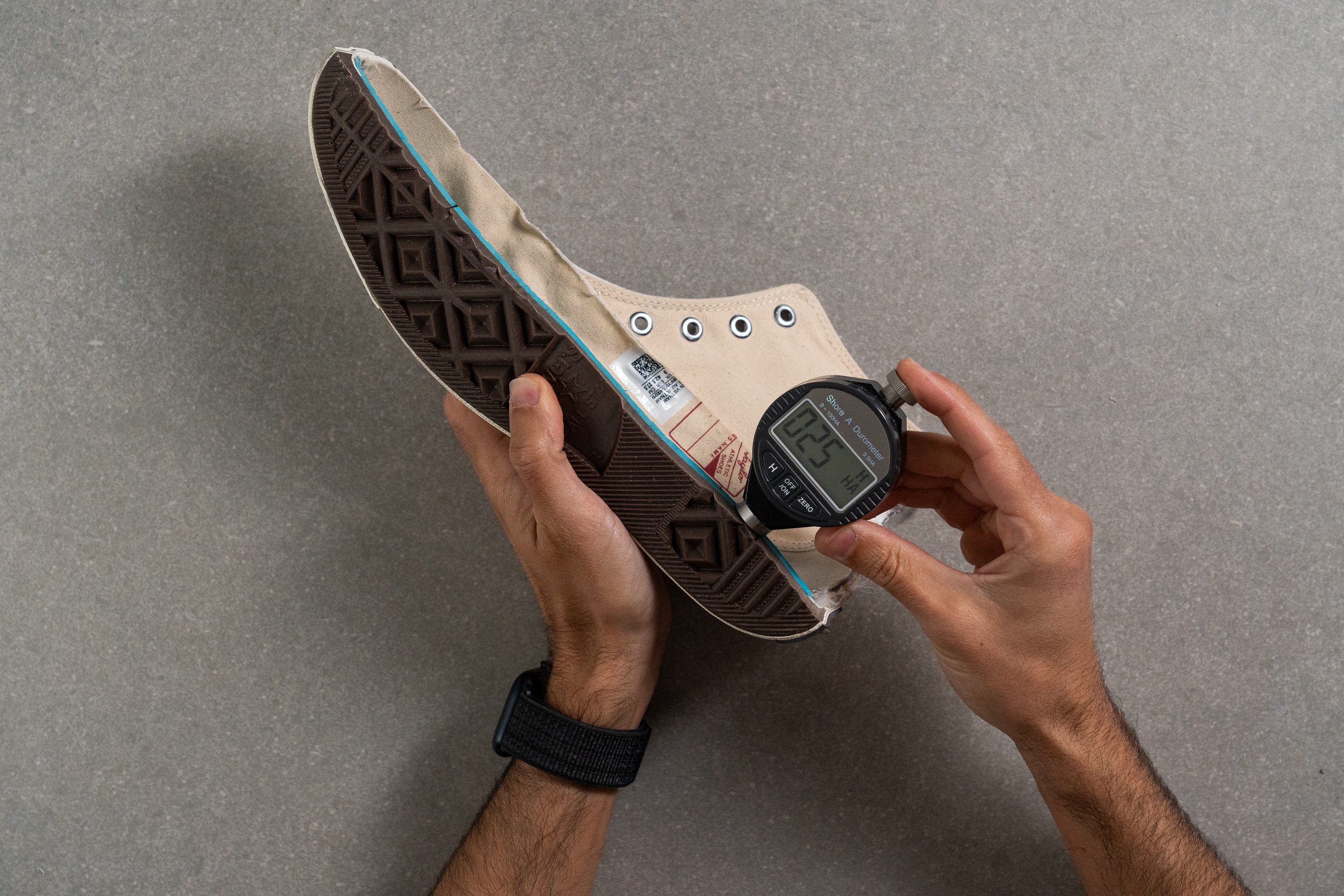
| Chuck 70 High Top | 25.1 HA |
| Average | 28.6 HA |
Size and fit
Size
Converse Chuck 70 High Top fits slightly large (49 votes).
Internal length
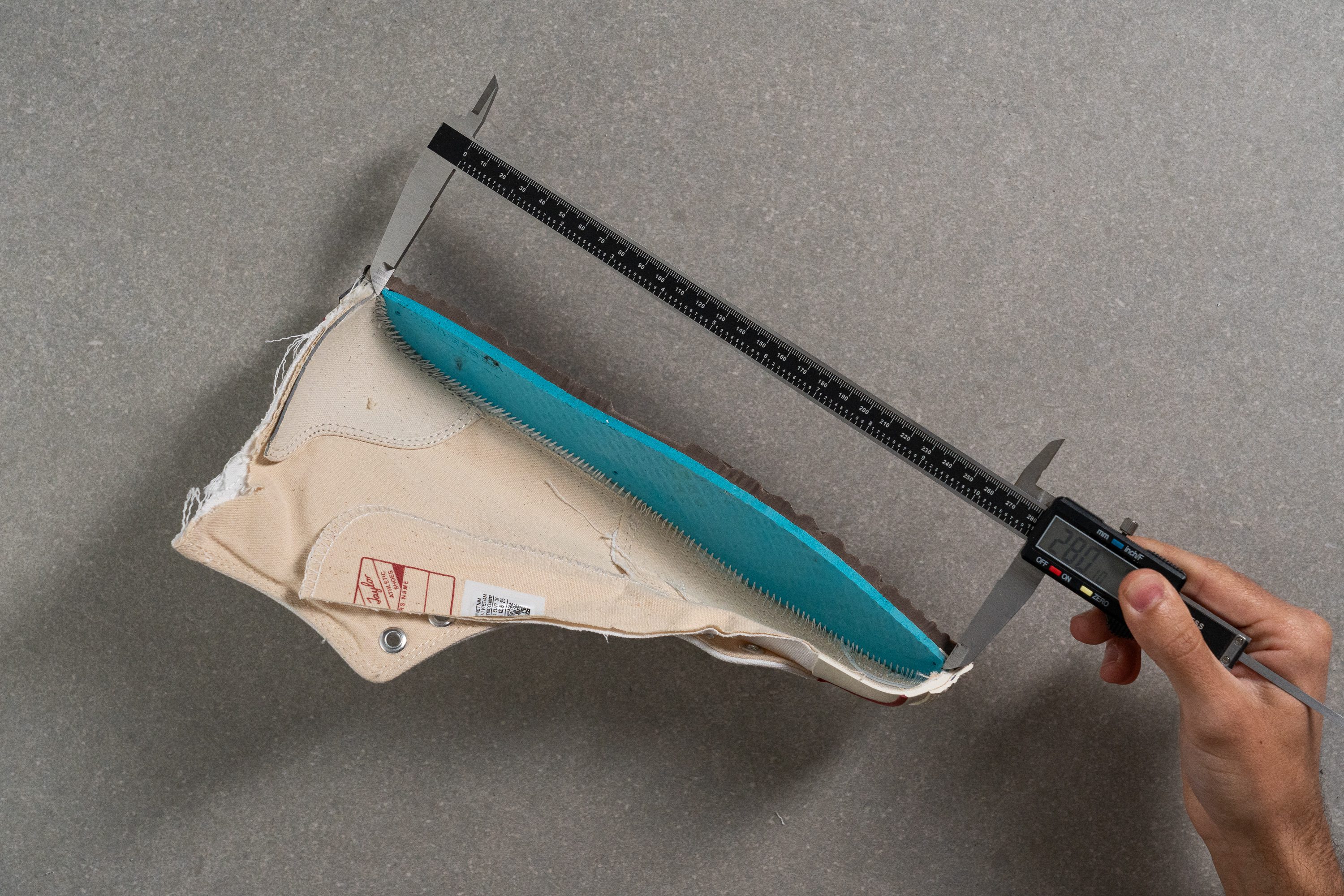
| Chuck 70 High Top | 280.1 mm |
| Average | 272.3 mm |
Width / Fit
The Chuck 70 High is a very close-fitting sneaker. In addition, the tall rubber sidewalls around the toebox make it feel even more cramped, especially in the beginning.
Measuring this Converse shoe in the widest part of the toebox, we got 100.1 mm. Even though it is the same as the average, it doesn't change the fact that the shoe's toebox is extremely tapered.
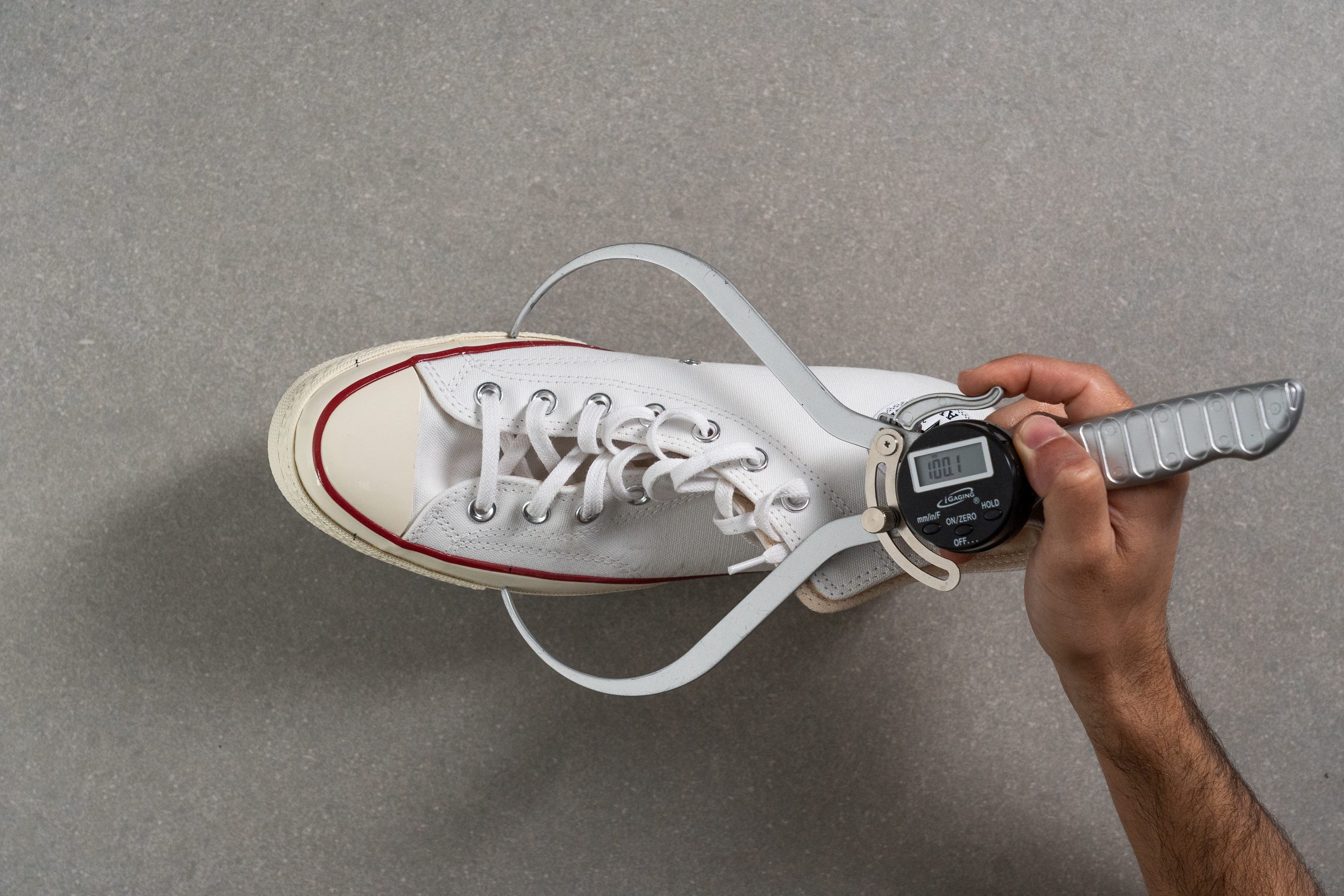
This test follows an older methodology, which is why you don't see recently tested shoes in the chart. Results from different methodologies can not be compared.
| Chuck 70 High Top | 100.1 mm |
| Average | 99.0 mm |
Toebox width
Measuring the shoe's toebox width where the big toe ends, our caliper returned 66.5 mm. That is about 10 mm narrower than the average! It is a very aggressive tapering.
Luckily, the Chuck 70 is now offered in a wide width as well, just like the original Chuck Taylor All-Star model.
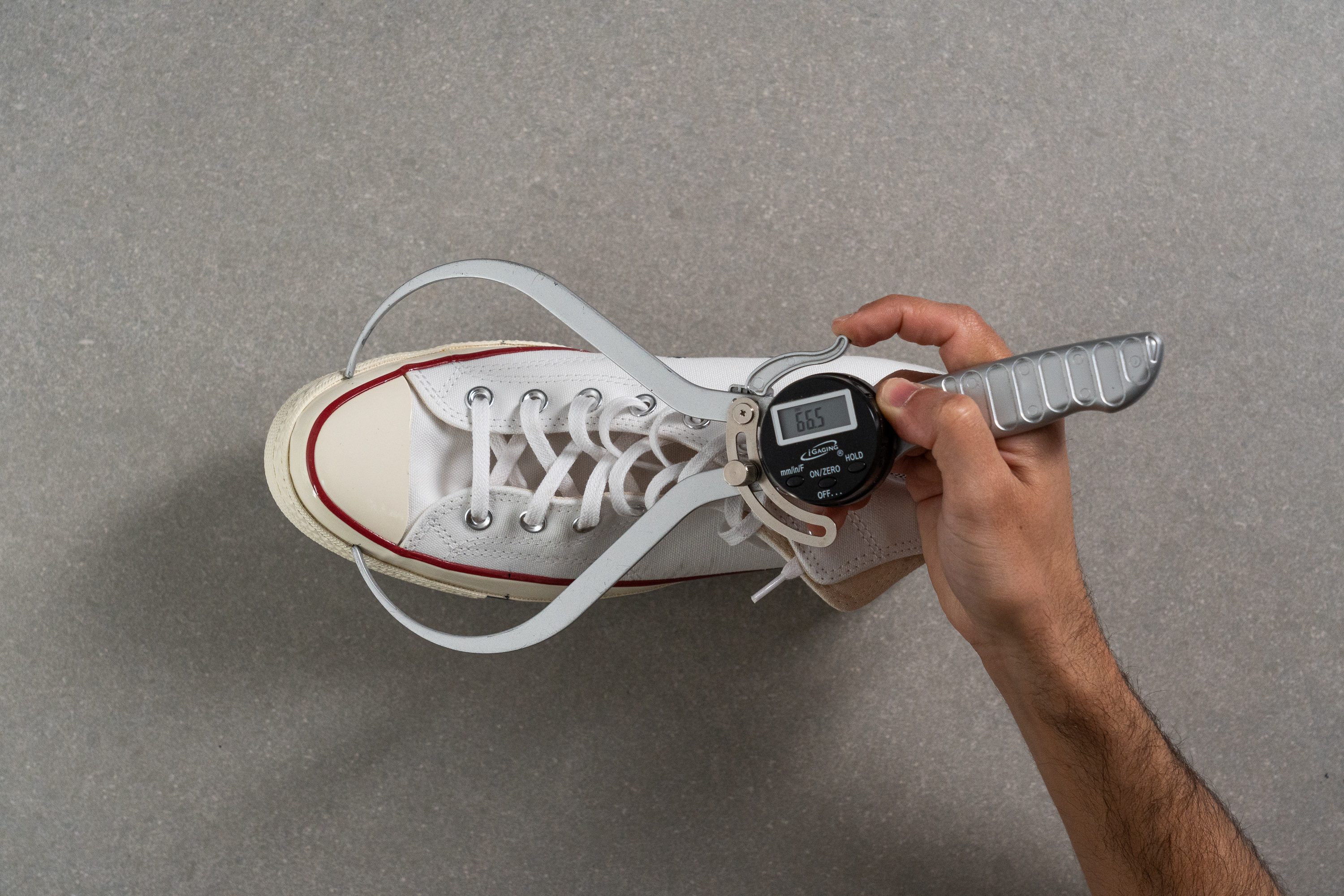
This test follows an older methodology, which is why you don't see recently tested shoes in the chart. Results from different methodologies can not be compared.
| Chuck 70 High Top | 66.5 mm |
| Average | 75.0 mm |
Traction / Grip
Traction test
The Chuck 70 High scored an above-average coefficient of friction (0.48) in our controlled grip test. This suggests a very reliable and consistent grip across dry and wet surfaces which is a huge bonus to the kick's functionality.
| Chuck 70 High Top | 0.48 |
| Average | 0.43 |
Outsole design
The shoe's signature diamond outsole hasn't changed much from the OG silhouette....just because it works!
Remember that it was a basketball shoe in the very beginning. What's more, it was the official shoe of the Olympics from 1936 to 1968 and was even chosen as the athletic training shoe by the U.S. armed forces during World War II.
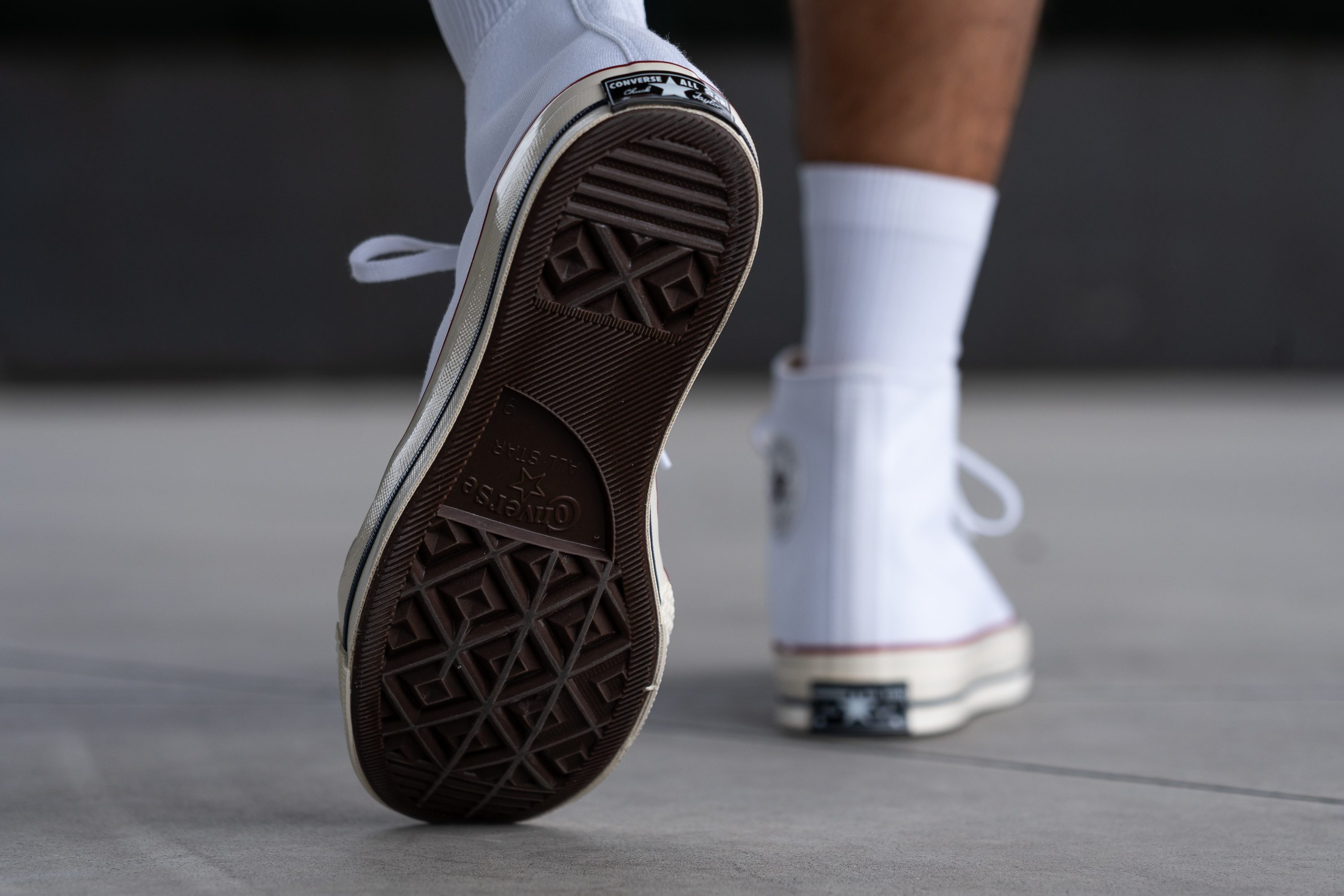
Flexibility / Stiffness
This Converse kick has a surprising amount of flexibility to it.
Our shoe-bending machine recorded that it takes only 9.3N to bend the Chuck 70 to a 30-degree angle. That's significantly less than it takes an average sneaker! Also, note that our tested pair is not even fully broken in yet.
In fact, our numbers show that the Chuck 70 High is almost as pliable as the Adidas Samba and Gazelle!
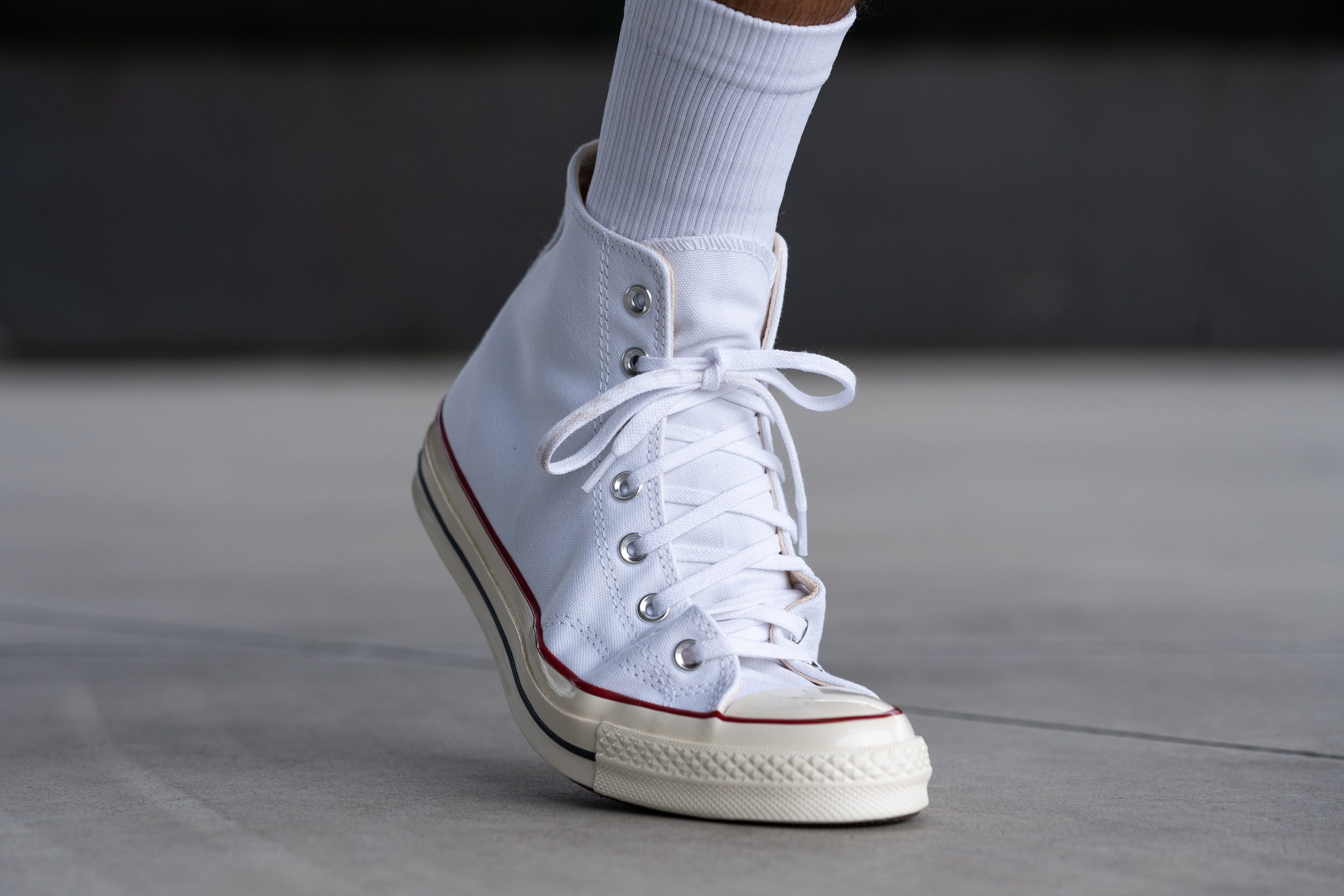
One of the common complaints about Converse kicks is that, eventually, the rubbery overlay starts to detach from the upper at the pinky toe, where the shoe bends most of the time. We found that the newer (and improved) Chuck 70 version of the sneaker takes that issue into account. The sealing looks much more solid than in the cheaper Chuck Taylor All Star.
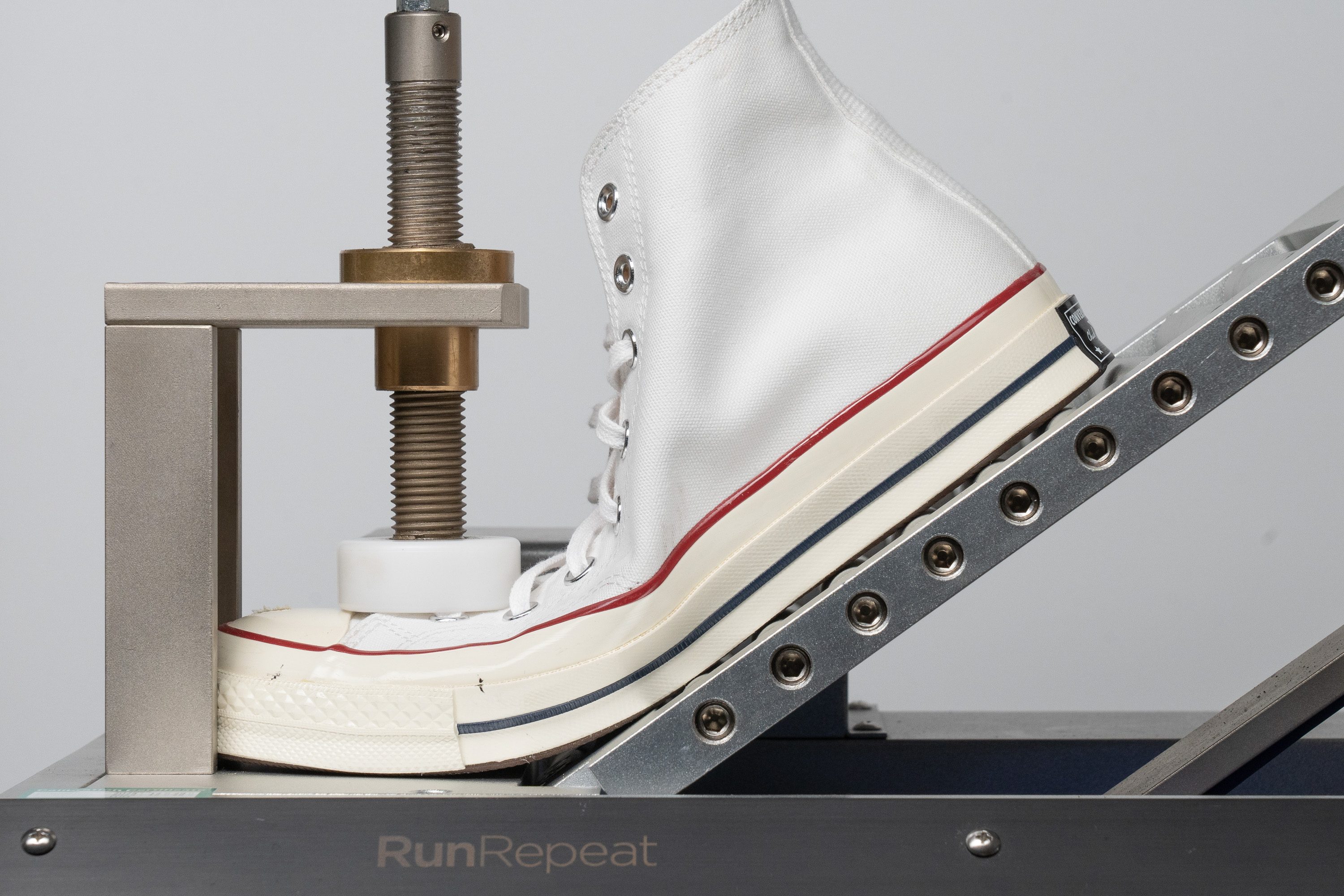
| Chuck 70 High Top | 9.3N |
| Average | 13.3N |
Weight
Among the high-top sneakers we've tested in our lab, the Chuck 70 is on the lighter side. It tips the scale at 17.0 oz (482g) in a men's US size 9.
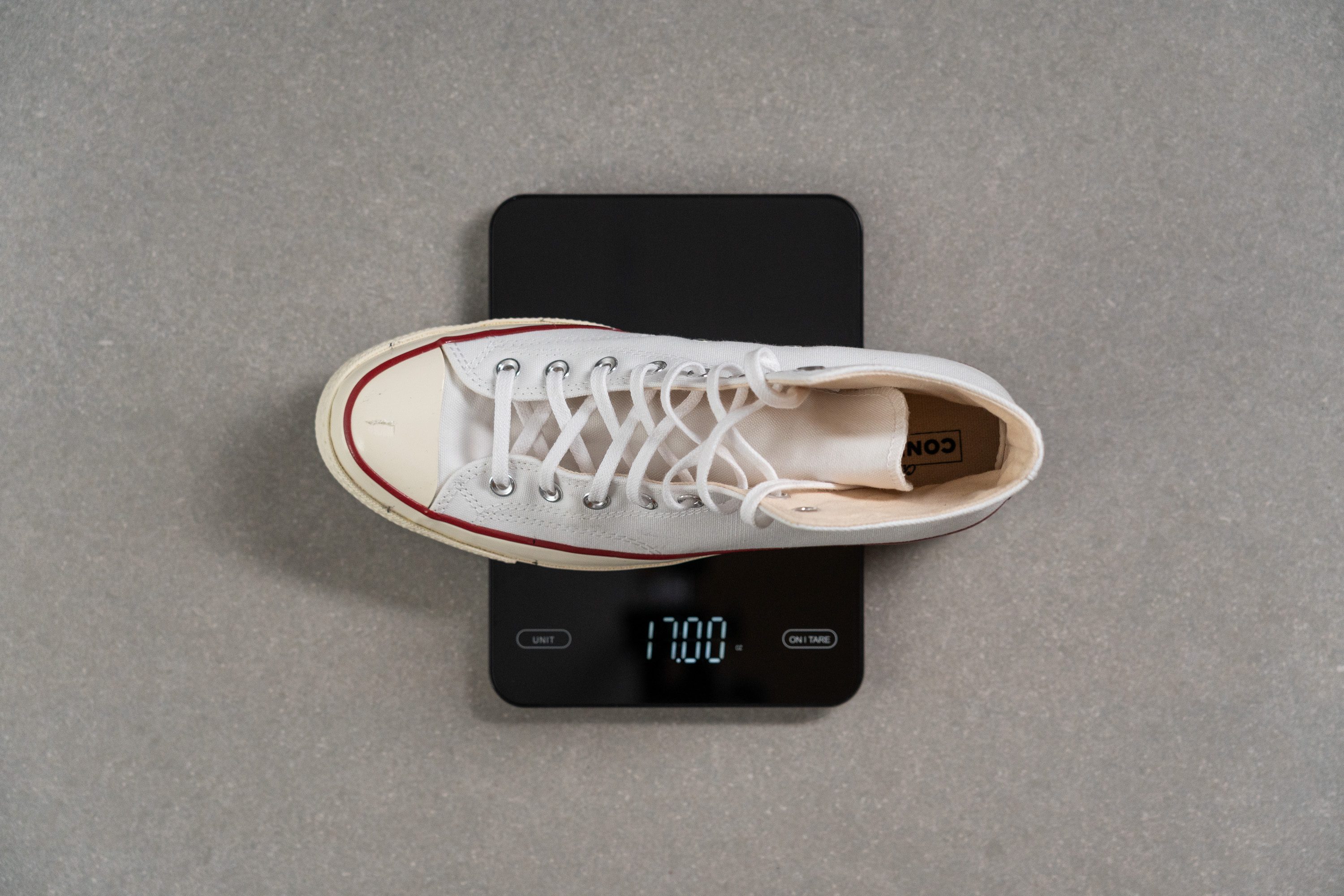
The bulkiest part of the shoe is obviously its sole. That's why it may feel somewhat bottom-heavy at first.
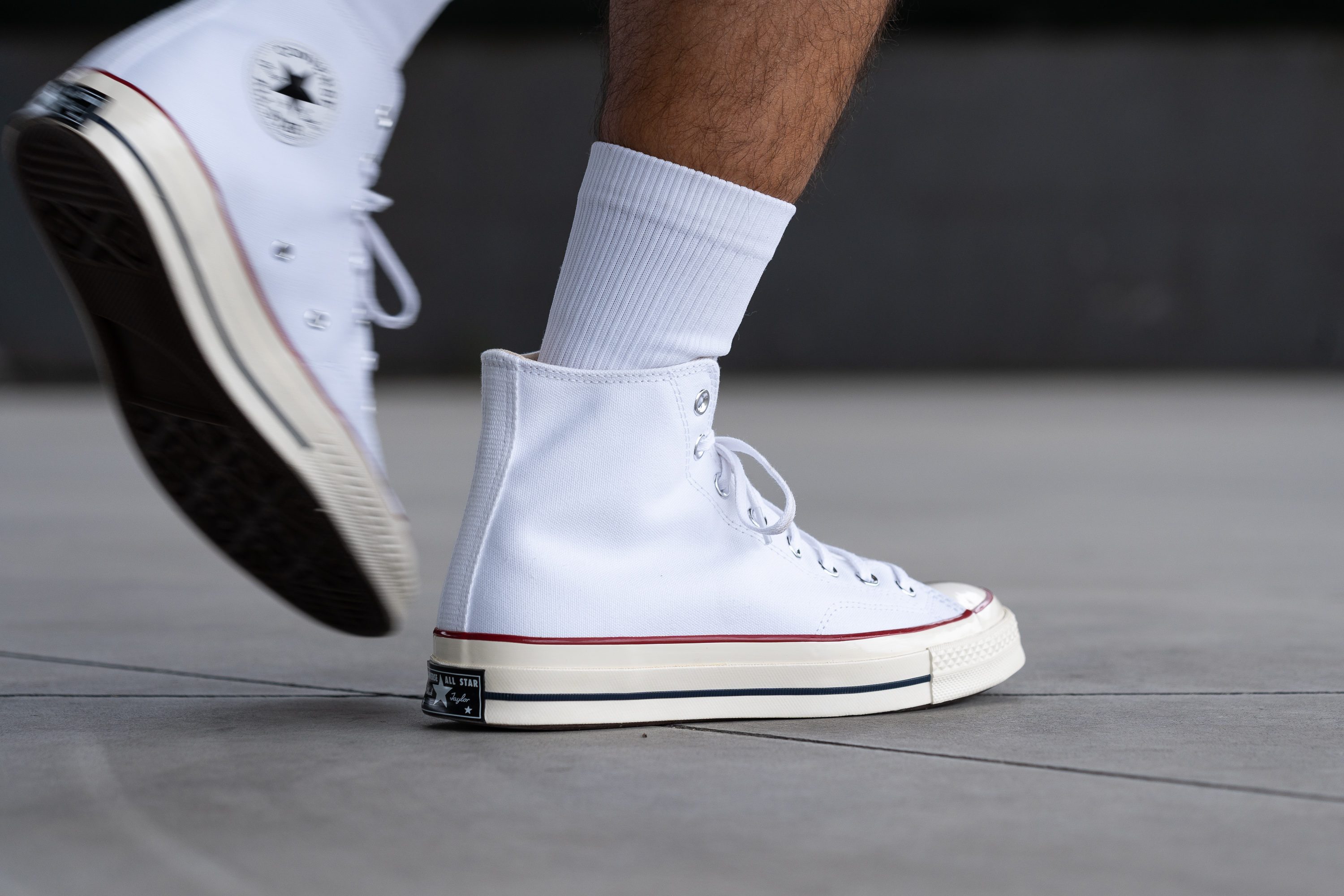
| Chuck 70 High Top | 17.0 oz (482g) |
| Average | 13.8 oz (390g) |
Breathability
Choosing the Chuck 70 for summertime is not the best idea considering the shoe's solid canvas upper.
Filling its upper with smoke in our breathability test, we weren't surprised to see just a tiny streak of vapor. It primarily passed through the metal eyelets and the gaps in between the tongue and the upper.
Two ventilation holes on the inner side of the sneaker didn't help the airflow as much either.
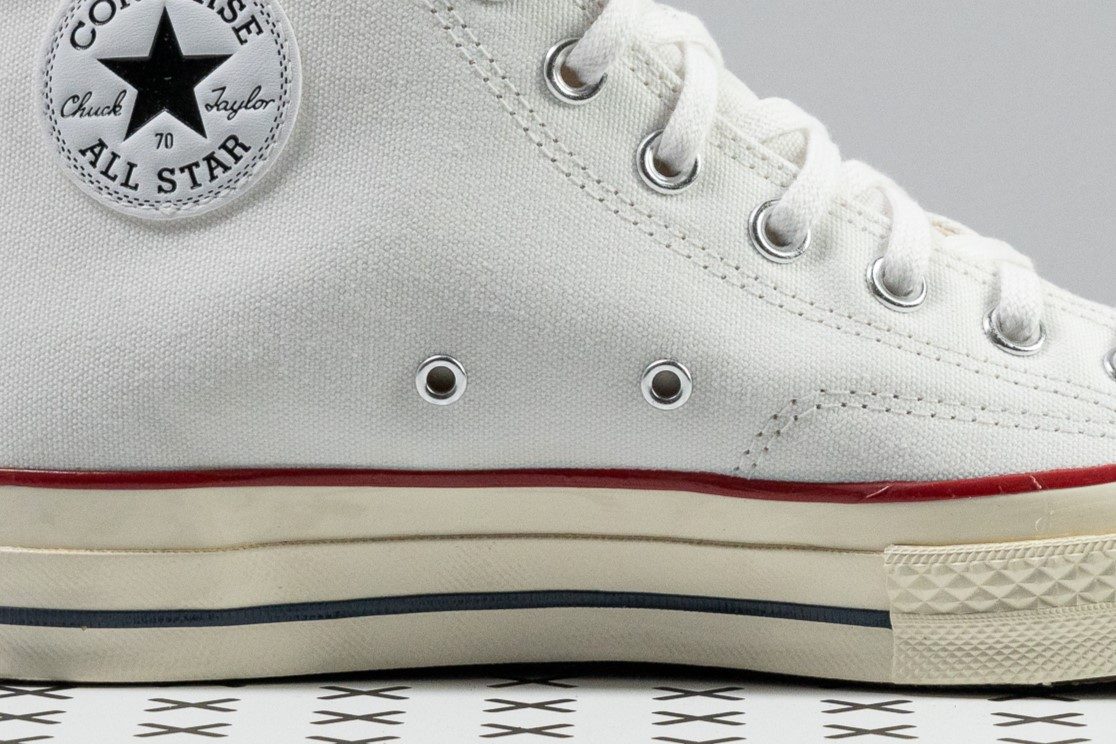
Even when we investigated the canvas through our microscope, we didn't see any pores that could potentially help the ventilation.

On a 1-5 scale, where 1 is the least breathable, we gave the Chuck 70 a low score of 2. It is not a great option for temperatures above 70°F (21°C).
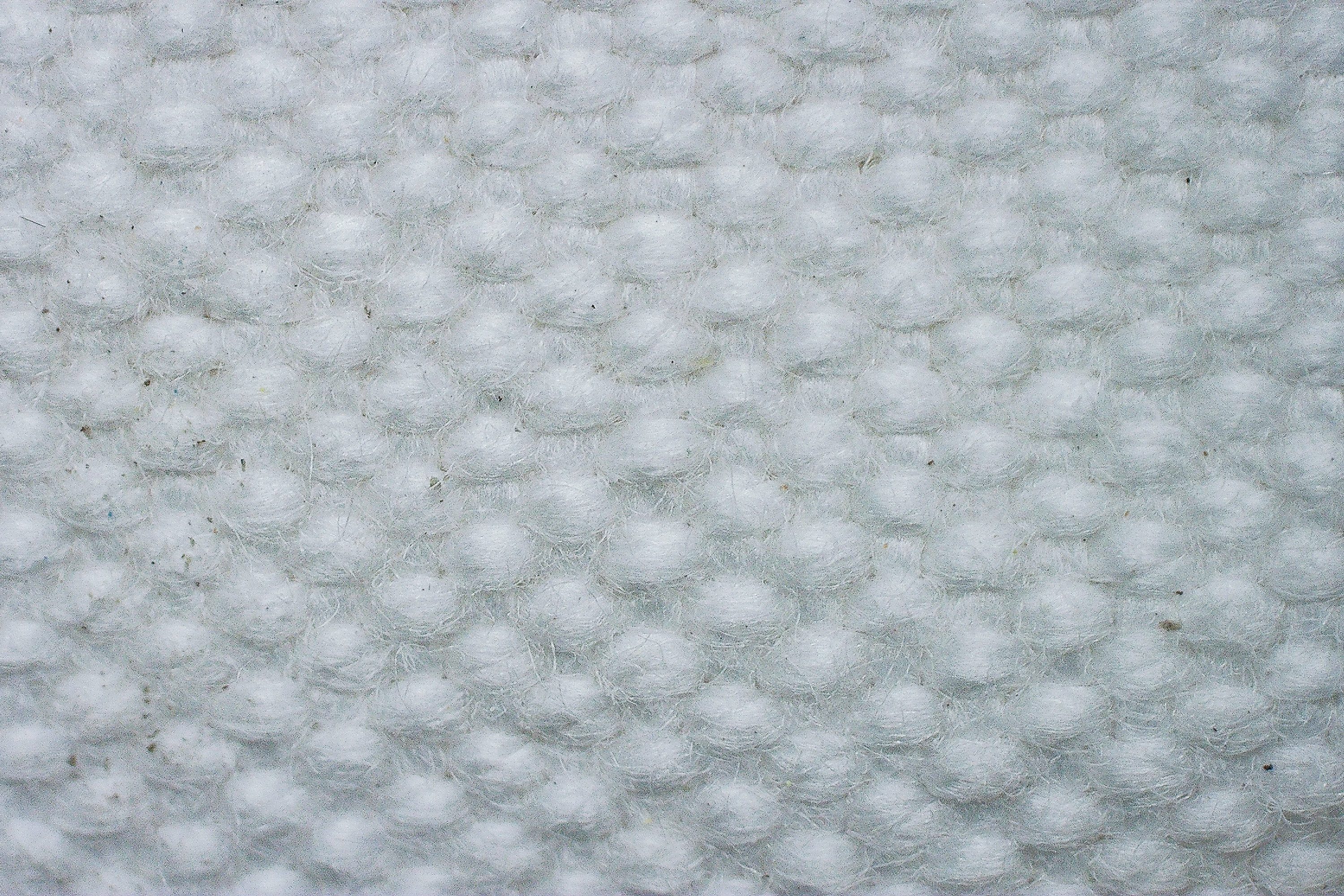
| Chuck 70 High Top | 2 |
| Average | 3 |
Stability
Lateral stability test
We found that the Converse Chuck 70 High feels stable but not supportive. Does that make sense? Let us explain.
The shoe's firm and nearly flat sole creates a stable platform that doesn't compress or collapse. Back in the day, this sensitive ground contact even made the kick popular for weightlifting, especially deadlifting!
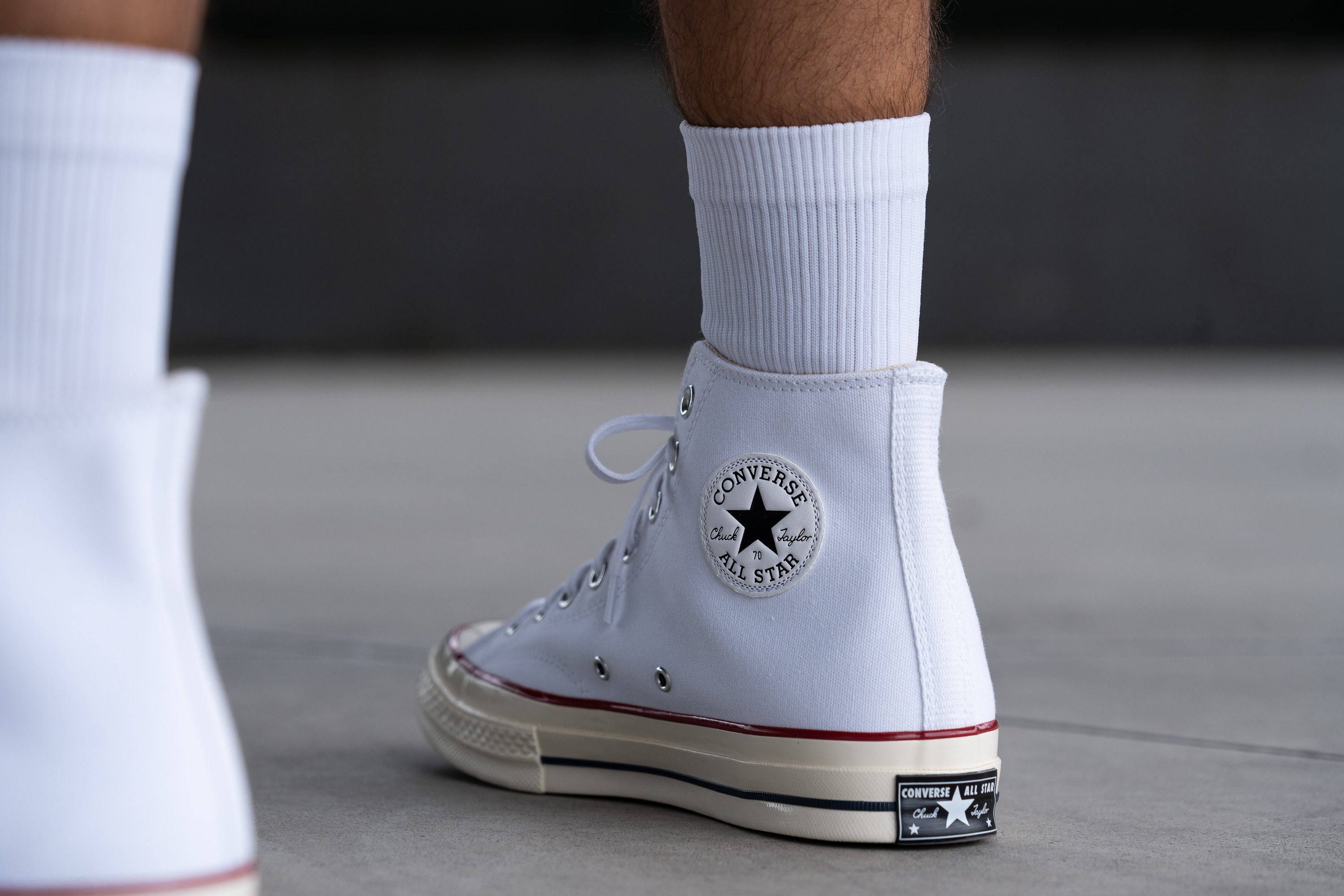
But if we are talking about side-to-side stability or arch support for people with overpornation, we wouldn't recommend this kick. Unfortunately, its canvas upper has no structure to it, and the sole is too narrow in the heel.
This is a recipe for spilling your foot over the sole or even rolling the ankle!
Torsional rigidity
The Converse Chuck 70 High comes across as a very stiff and unforgiving kick.
But as our manual test showed, it is actually more pliable than the average sneaker! On a 1-5 scale, where 1 is the most flexible, we rated its torsional rigidity as 2.
This is another reason why it bends well with the foot but doesn't offer much lateral stabilty.
| Chuck 70 High Top | 2 |
| Average | 3.6 |
Heel counter stiffness
There is basically no heel counter in the Converse Chuck 70.
Giving it a push and squeeze in our manual test, we found that there is pure canvas and nothing else.
There is pretty much no heel hold or ankle support in this Converse shoe but you do get the benefit of an adaptive fit. It is a high-top sneaker that conformably moves with your feet letting you be the one in charge.
| Chuck 70 High Top | 1 |
| Average | 3.2 |
Midsole width - forefoot
The Chuck 70 inherited the narrow sole of the original silhouette.
Measuring it in the widest part of the forefoot, our caliper showed 103.0 mm. It is more than 5 mm narrower than average!
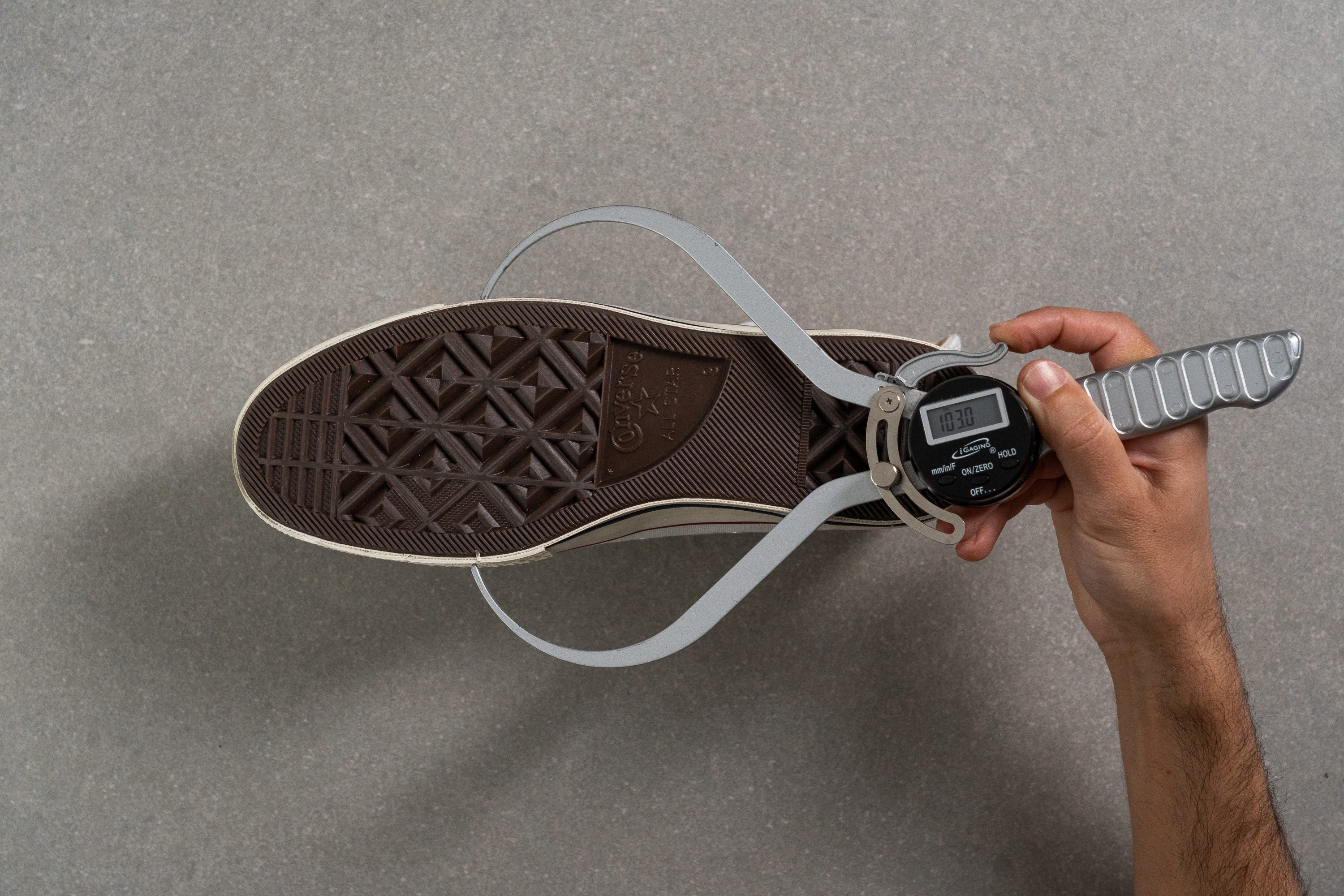
Even though the narrower sole detracts from stability, it creates a slimmer profile that feels like a break from the highly popular chunky kicks of today.
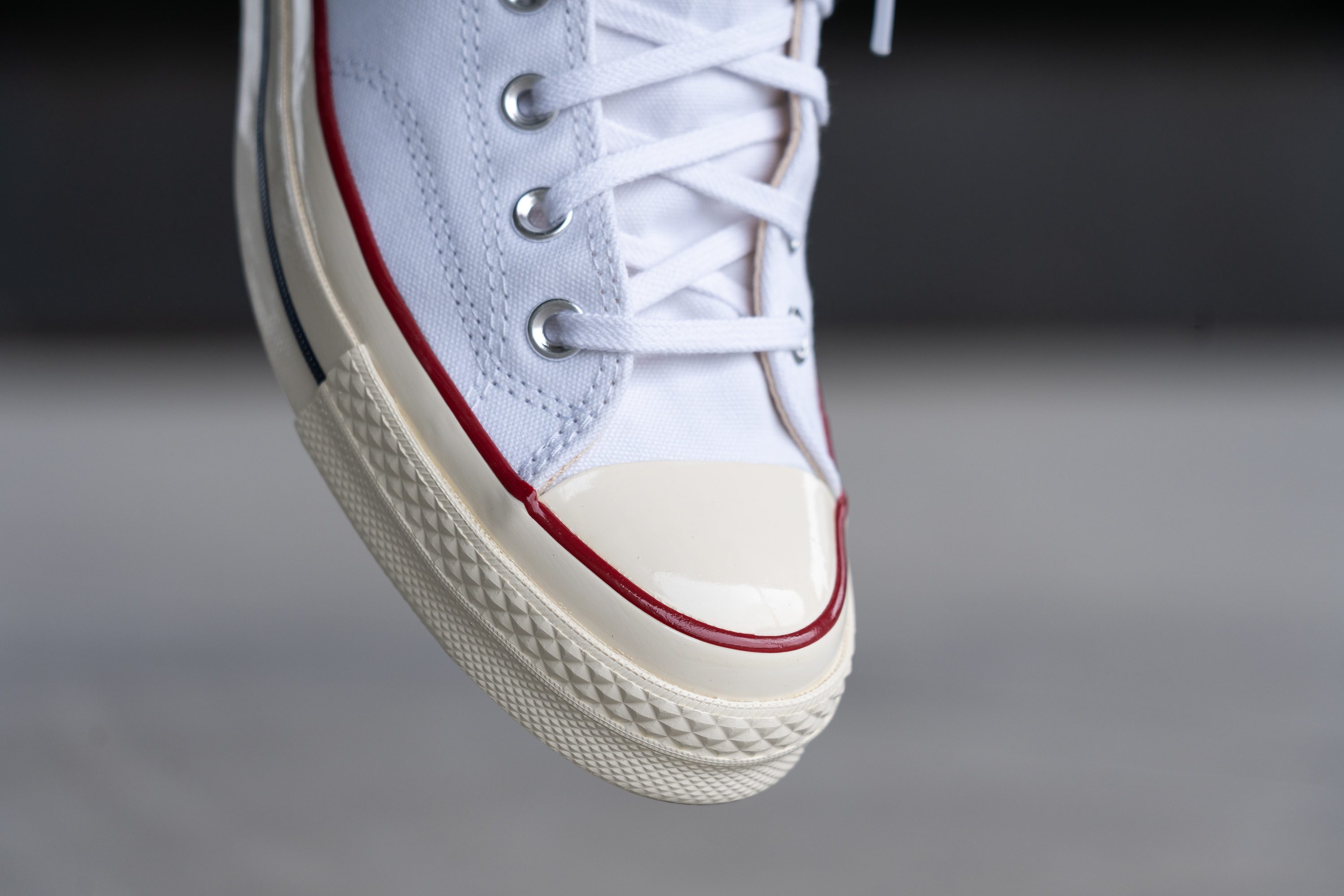
| Chuck 70 High Top | 103.0 mm |
| Average | 108.9 mm |
Midsole width - heel
The shoe's platform gets even narrower in the heel.
Here, our caliper showed only 73.6 mm in the widest part. That's a whole 10 mm narrower than in the average sneaker.
Such a slim profile can make people with flat feet and overpronation feel less than surefooted in the Converse Chuck 70 High.
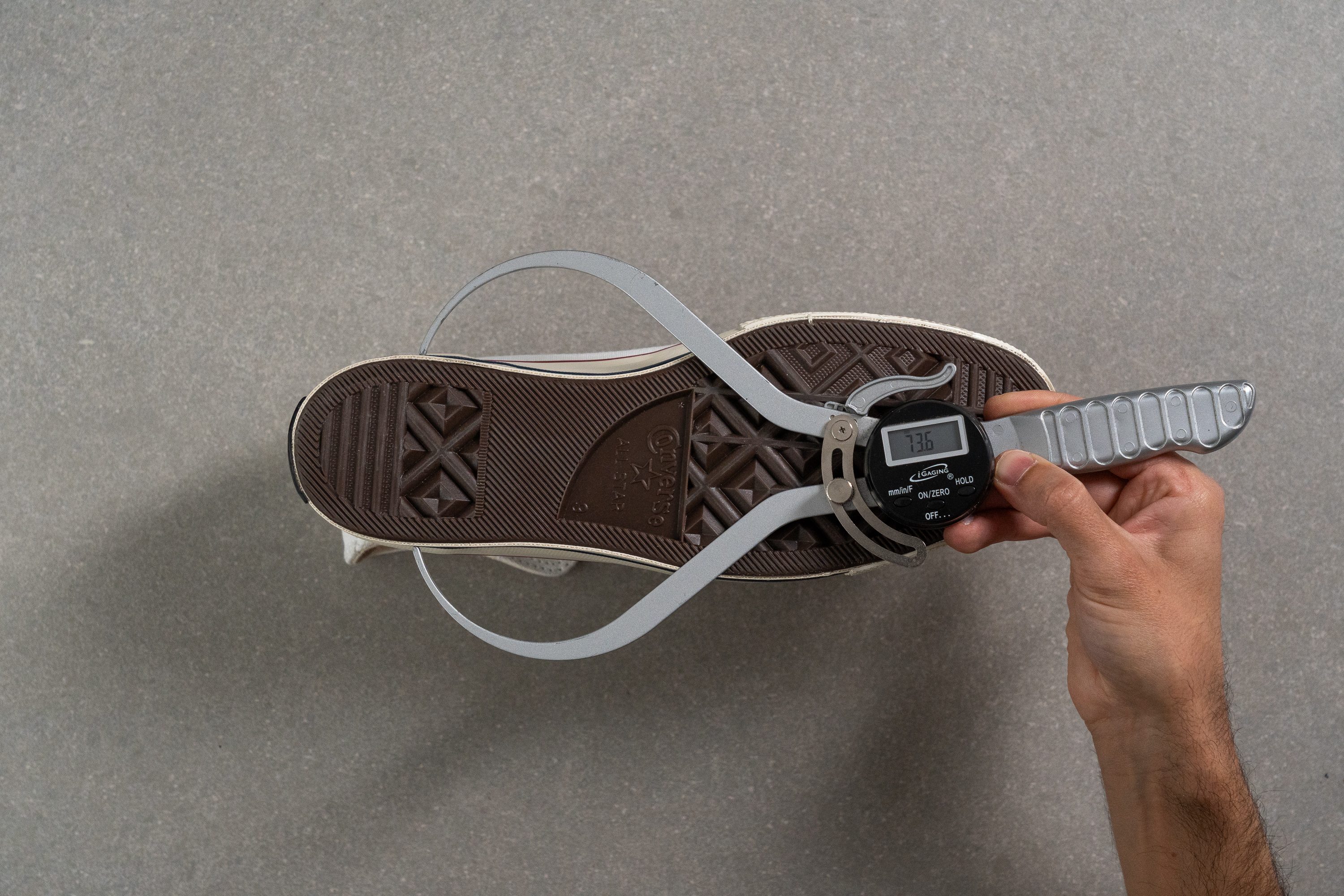
| Chuck 70 High Top | 73.6 mm |
| Average | 84.0 mm |
Durability
Toebox durability
Let us not forget that the original Chuck All Star was intended for basketball. It explains the sneaker's reinforced design, especially in the toebox.
We used a Dremel with a sandpaper tip to check the wear resistance of the shoe's toe cap. After drilling it for 12 seconds at 5K RPM speed and 3.2N pressure, we found it to be very sturdy indeed!
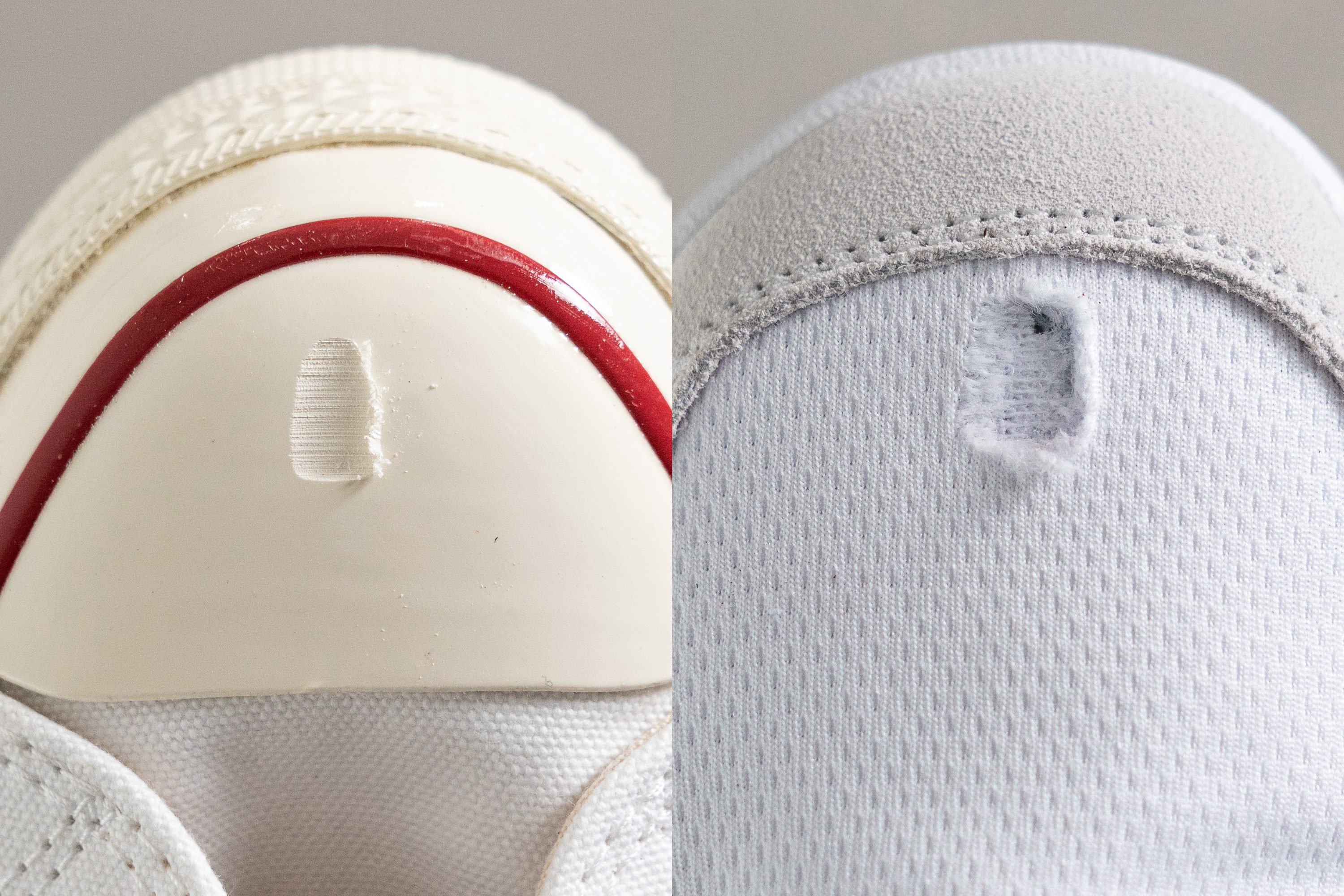
Compared to the unprotected mesh uppers on some other sneakers, this Converse boasts excellent durability.
On a 1-5 scale, where 5 stands for maximum durability, the Chuck 70 earned a solid 4.
Finally, a shoe which you can knock around and bump into things without worry!
| Chuck 70 High Top | 4 |
| Average | 3.7 |
Heel padding durability
Unfortunately, the same cannot be said about this kick's inner lining.
The textile inside the ankle collar got torn after a mere 4 seconds of drilling it with our Dremel. Compared to other sneakers, the result is worse than the average.
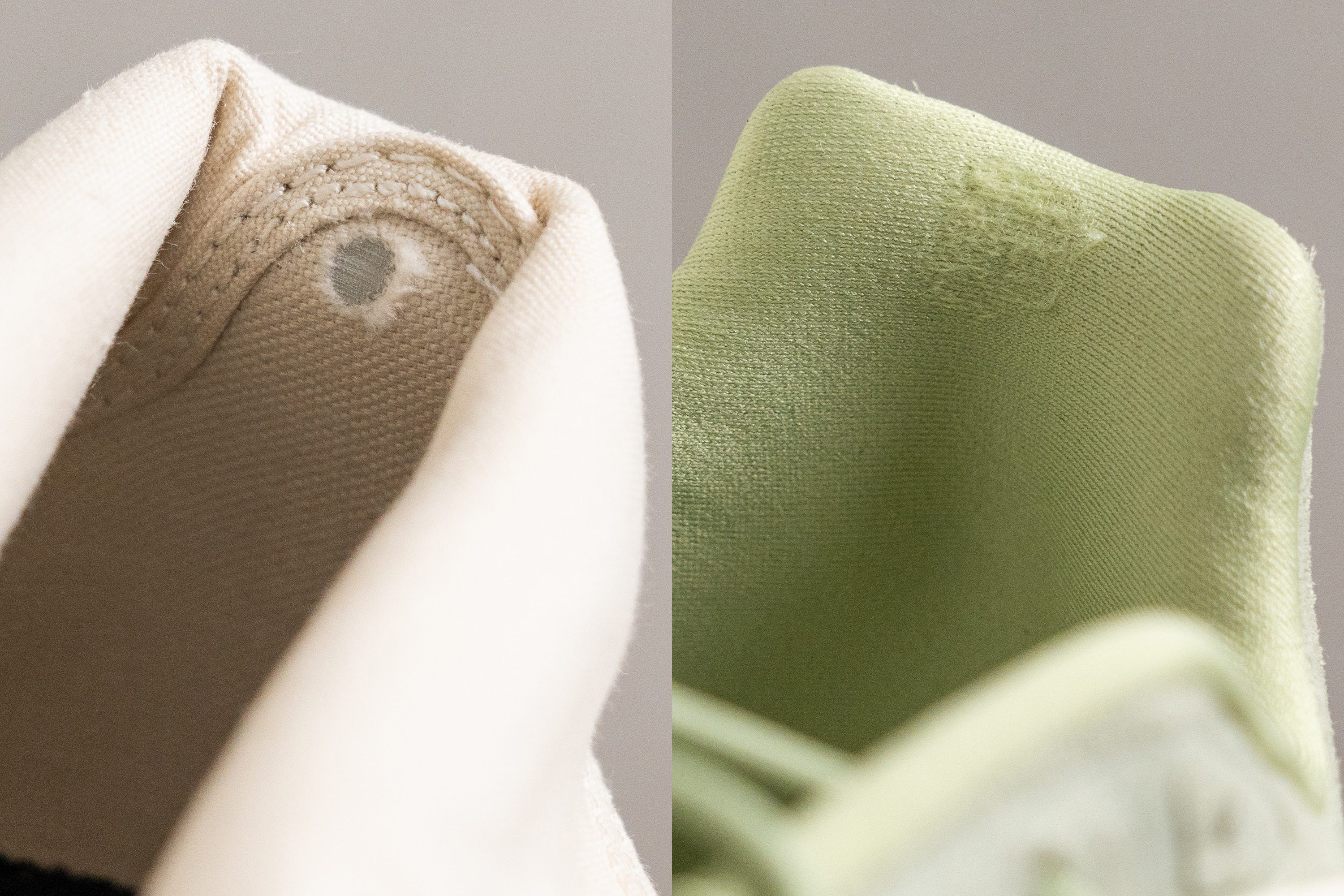
We think that this will be the first part of the kick to show signs of wear. On a 1-5 durability scale, where 1 is the least durable, the Chuck's heel lining gets only 2.
| Chuck 70 High Top | 2 |
| Average | 3.2 |
Outsole hardness
On a lighter note, we are not worried about the outsole of this Converse sneaker at all!
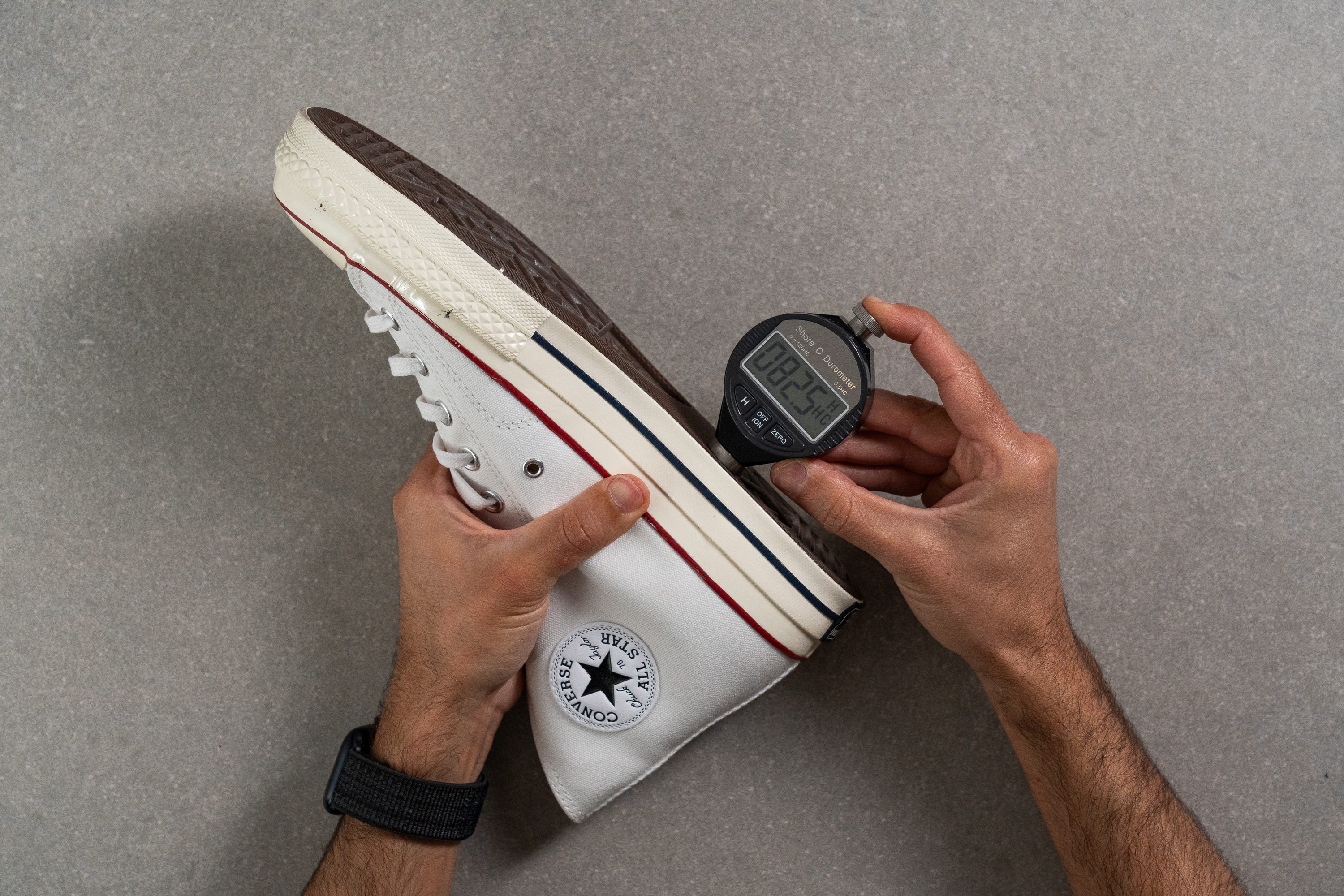
The kick's rubber shows a durometer measurement of 82.9 HC which is close to the average. It indicates a good level of hardness which makes the outsole tougher to wear out.
| Chuck 70 High Top | 82.9 HC |
| Average | 85.7 HC |
Outsole durability
Even in our highly demanding Dremel test, the Chuck 70 took all the abuse without showing significant wear.
With the speed set to 10K RPM, we applied the tool's sandpaper tip to the rubber for 22 seconds. We were pleased that the damage was just the same as the average - only 1.1 mm.
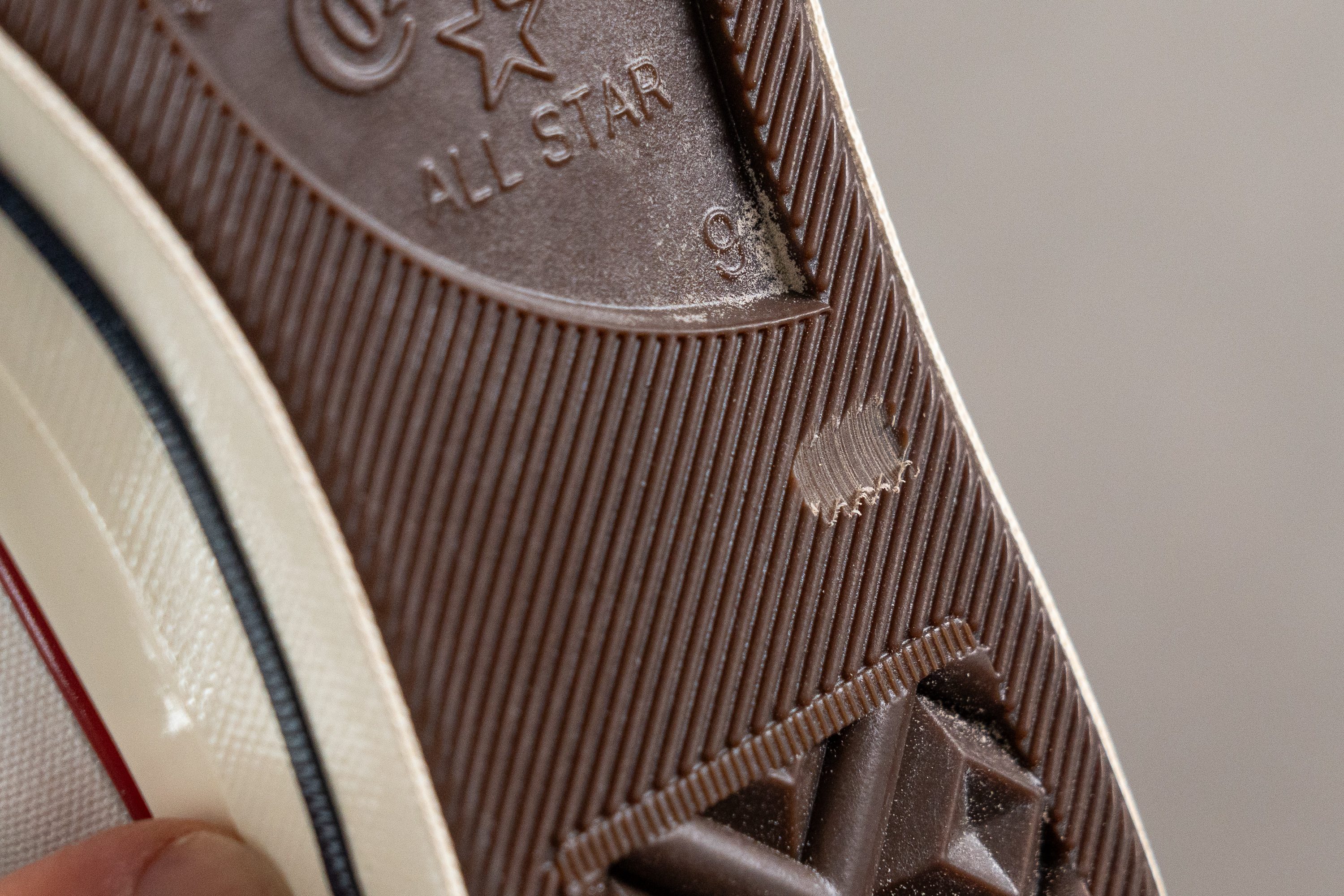
| Chuck 70 High Top | 1.1 mm |
| Average | 1.1 mm |
Outsole thickness
As a hoop shoe in its past reincarnation, the Chuck 70 features a very thick rubber layer underfoot. Measuring it with our caliper returned 7.4 mm which is 2 mm thicker than most kicks!
All things considered, we are not surprised that some wearers of the Converse Chuck 70 don't need to replace their old pair in less than a year! It is a truly durable sneaker.
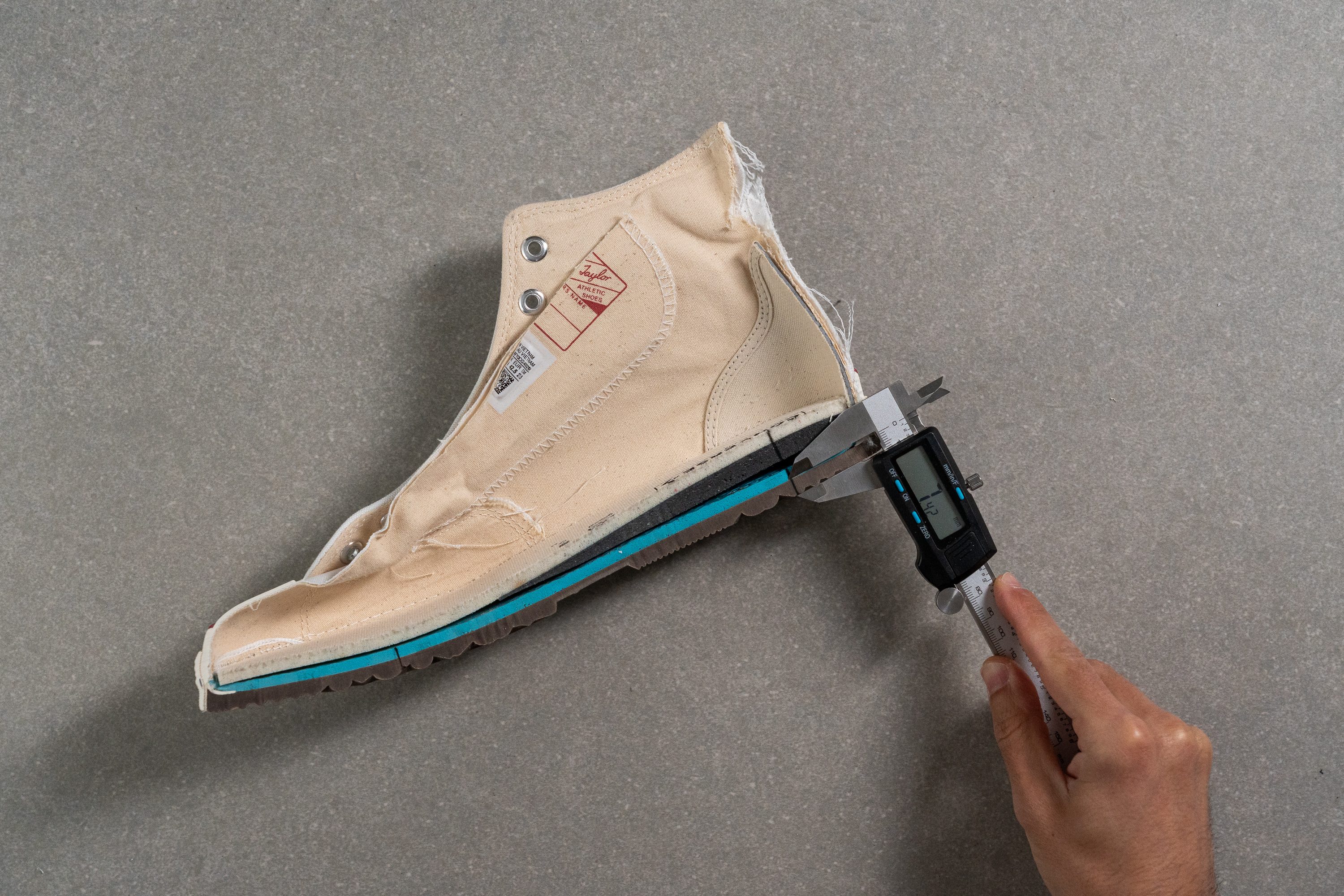
| Chuck 70 High Top | 7.4 mm |
| Average | 5.3 mm |
Misc
Insole thickness
To make the walking experience pleasant enough, the Chuck 70 features an impressively thick and comfy OrthoLite insole.
It is a whopping 13.9 mm thick! Maybe it should be considered the shoe's midsole instead?
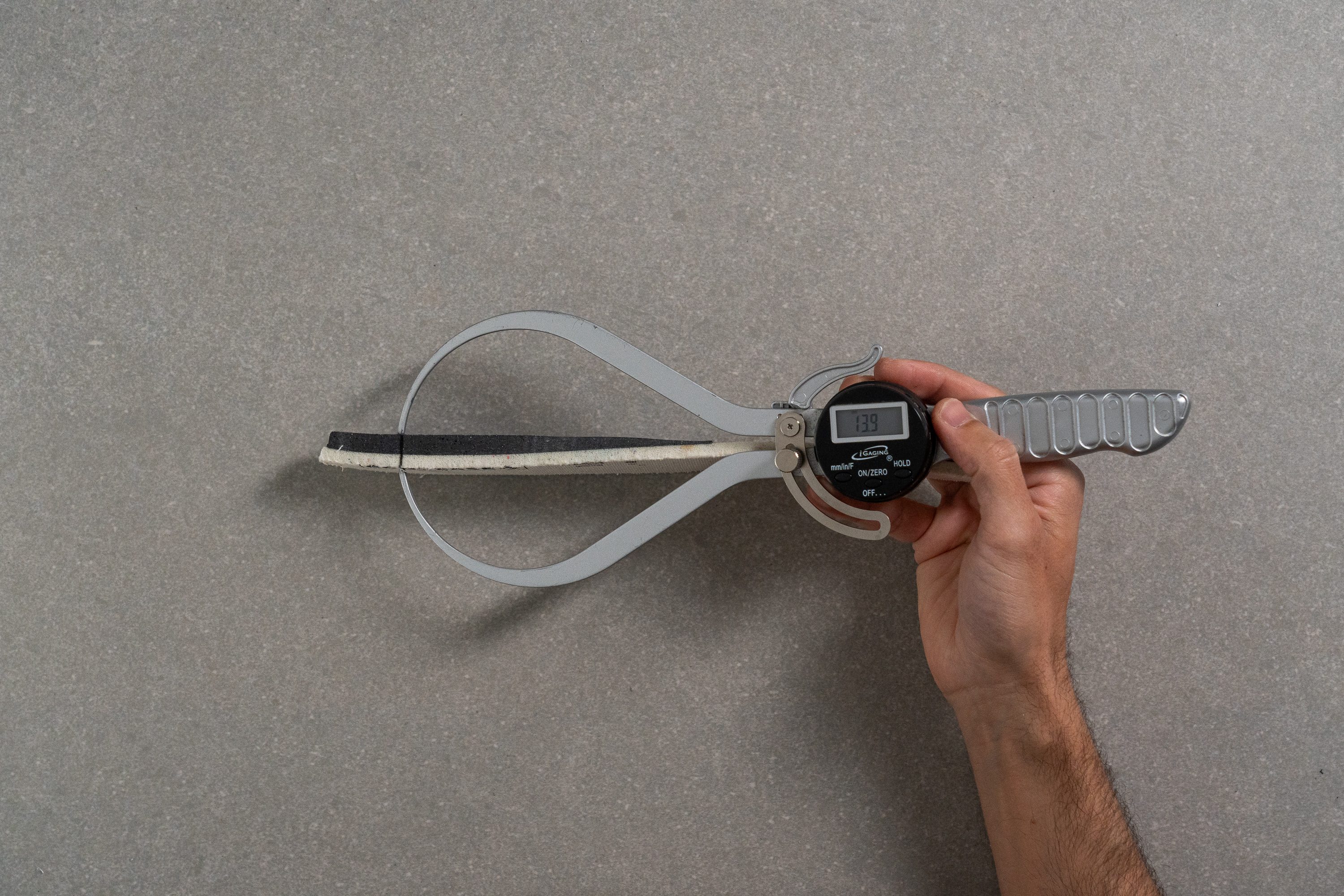
| Chuck 70 High Top | 13.9 mm |
| Average | 5.1 mm |
Removable insole
The insole of this Converse shoe is easily removable. But we wouldn't recommend replacing it for two reasons:
- it is very thick (13.9 mm) and basically works as the shoe's primary cushioning
- it follows the narrow and tapered shape of the shoe (not every insole can be adjusted to this Converse kick)
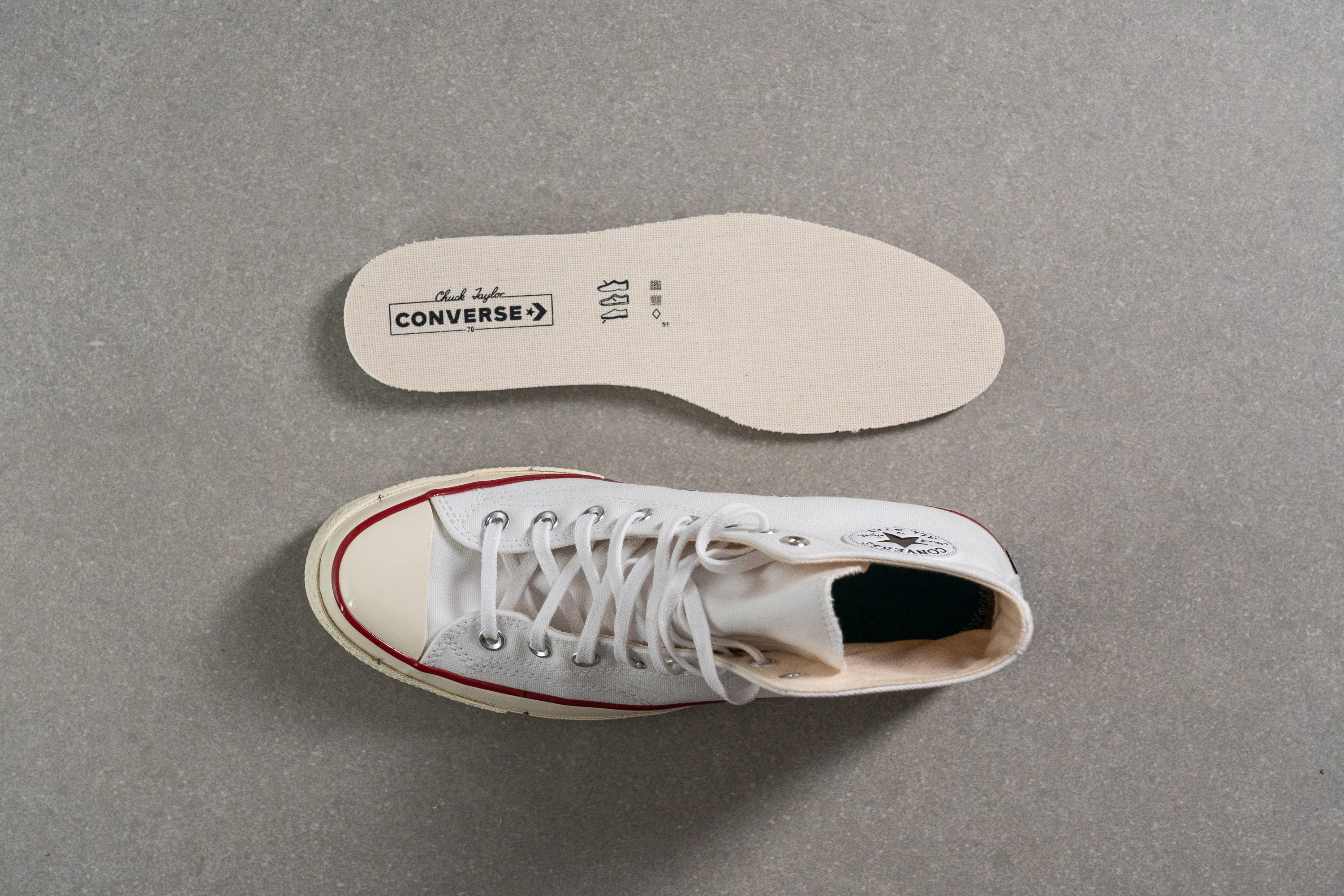
| Chuck 70 High Top | Yes |
Reflective elements
The base model of the Converse Chuck 70 High doesn't have any reflective elements.
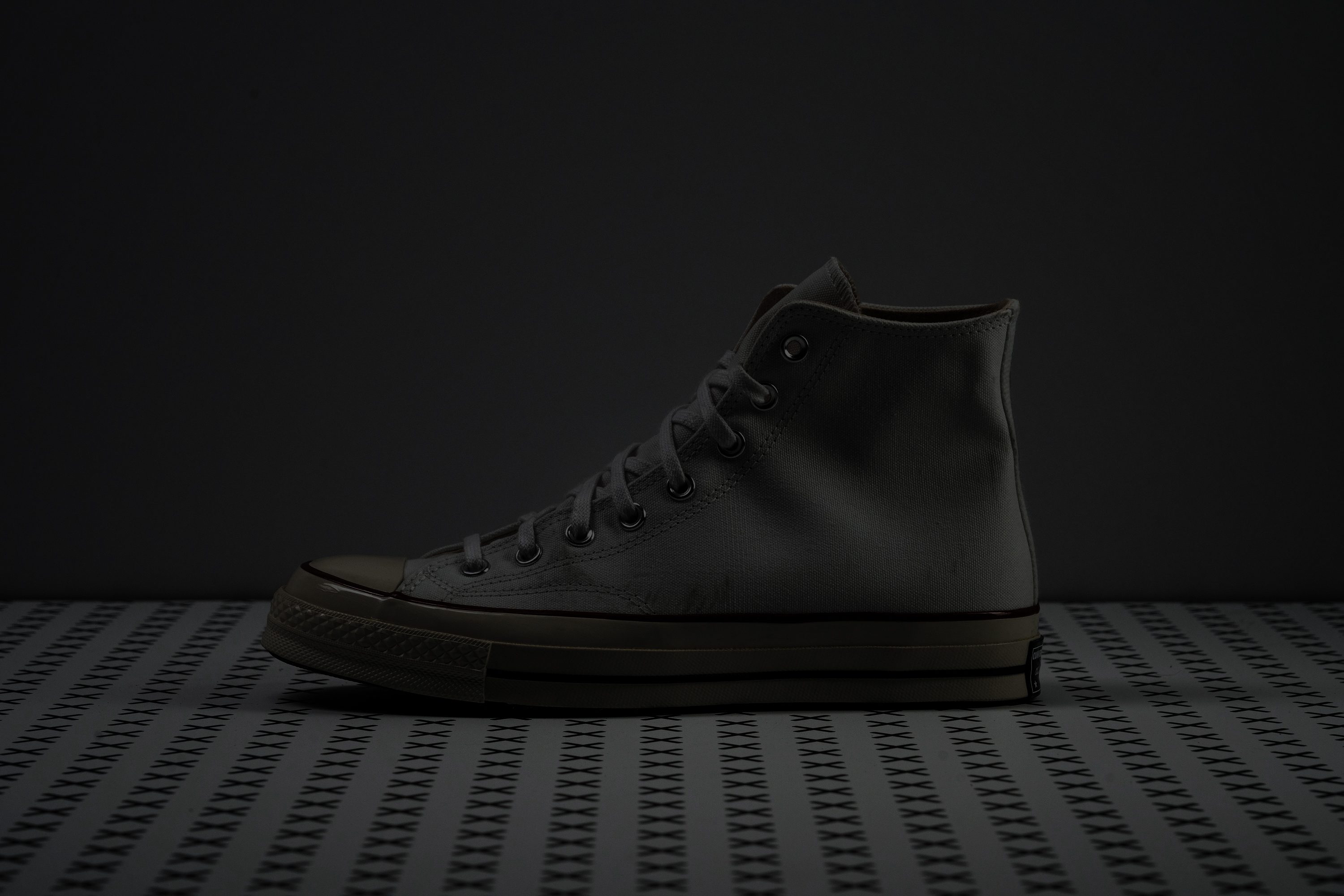
| Chuck 70 High Top | No |
Tongue padding
Converse kicks have some of the thinnest tongues in the industry. Measuring one on the Chuck 70 High, we got as little as 1.3 mm.
It's just a small piece of canvas that lies in between the metal eyelets and the wearer's skin.
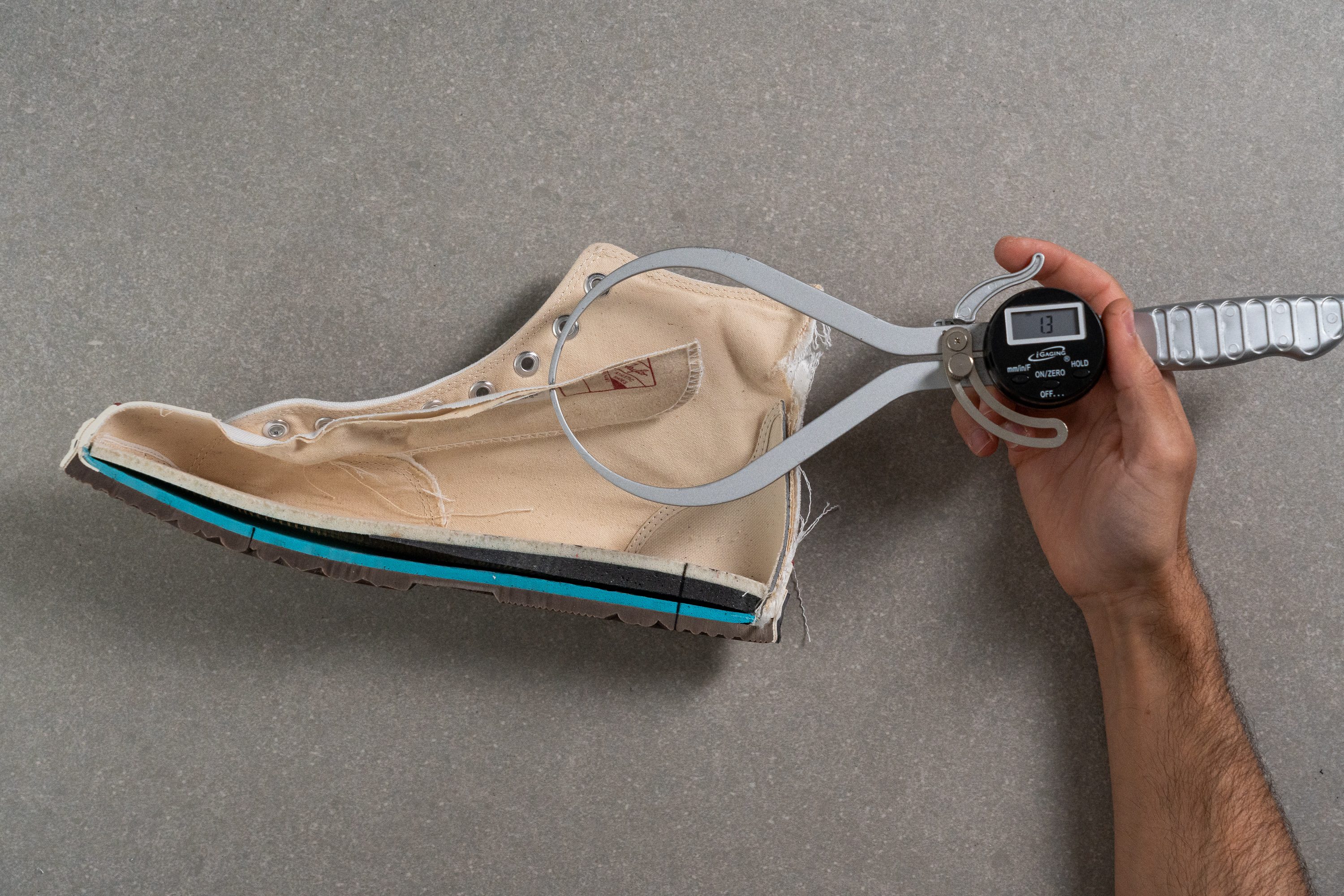
| Chuck 70 High Top | 1.3 mm |
| Average | 9.6 mm |
Tongue: gusset type
The shoe's tongue is not attached to the sides of the upper. It can shift sideways a little but not critically.
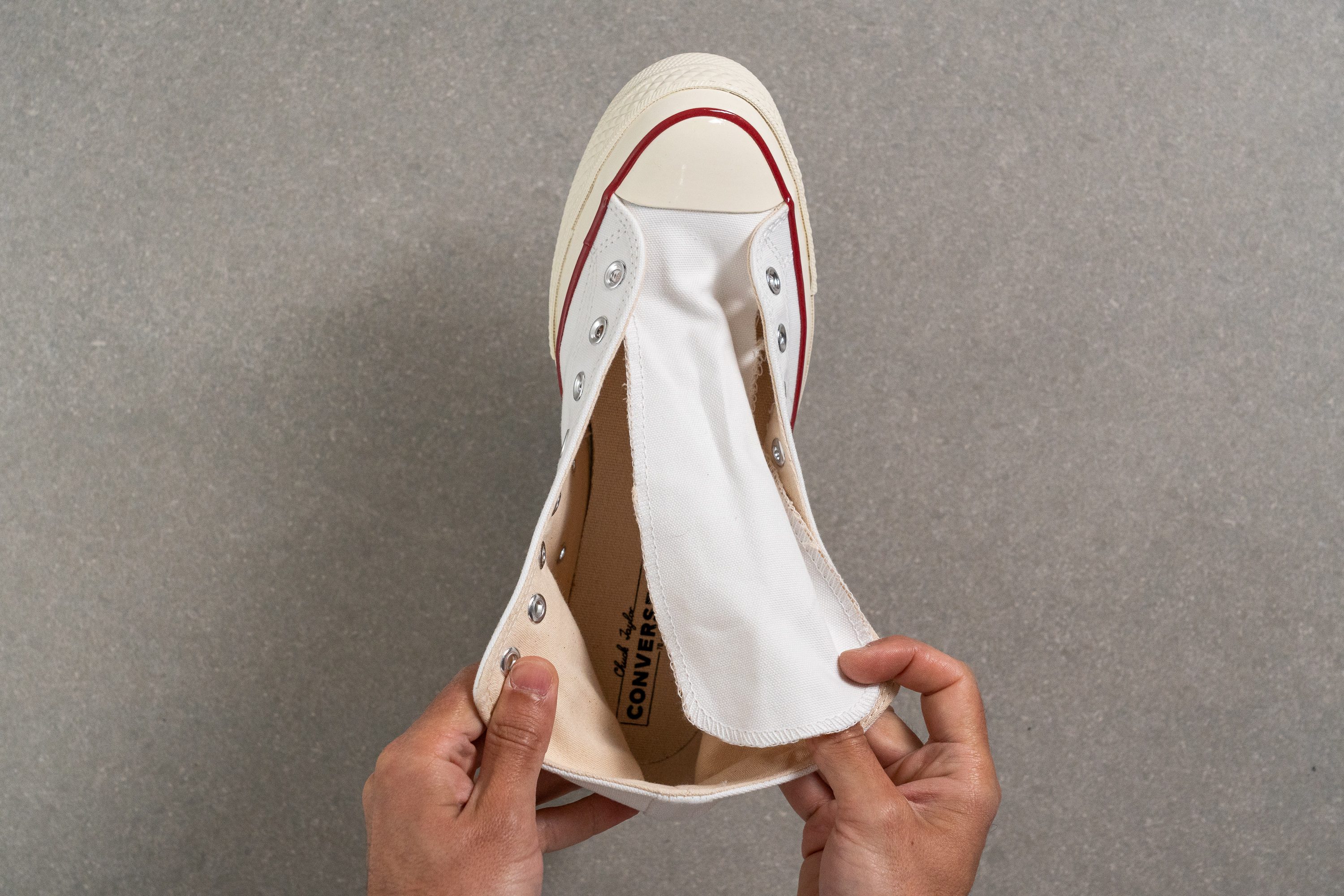
| Chuck 70 High Top | None |
Heel tab
The Chuck 70 High doesn't come with a pull tab but it's pretty easy to slide into anyways.
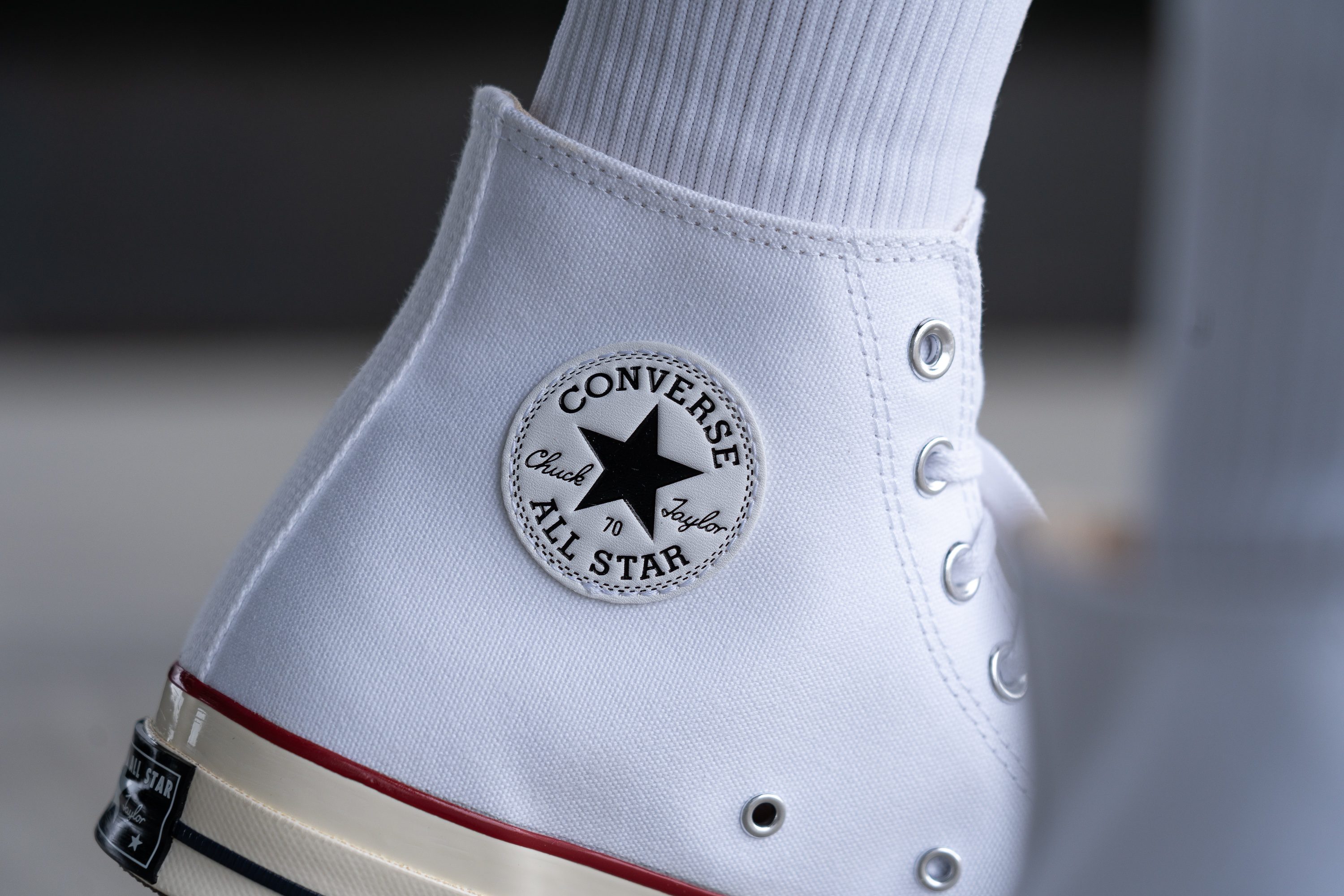
The laces, on the other hand, take some time to fiddle with.
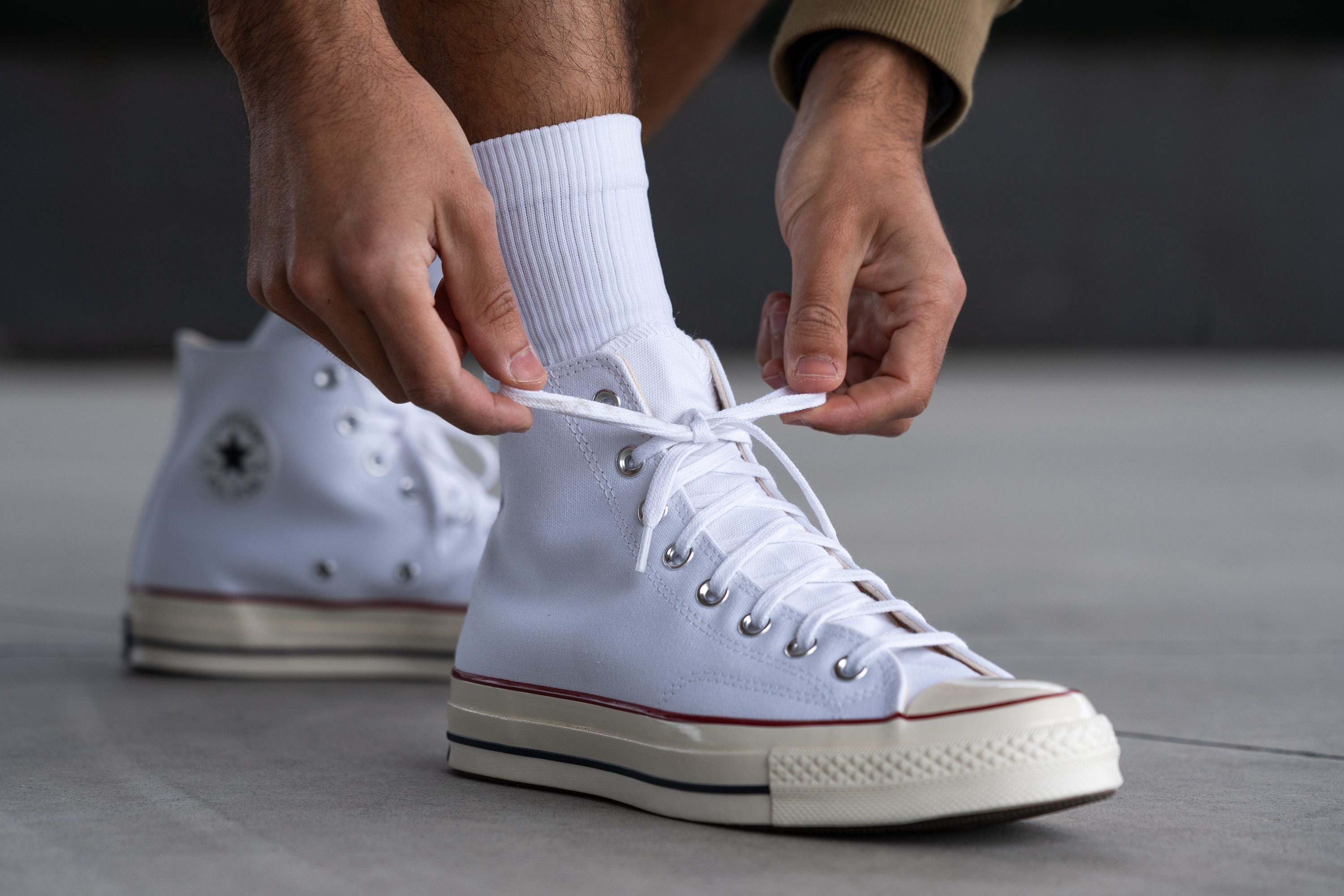
| Chuck 70 High Top | None |
The origins of the Converse Chucks
Believe it or not but the Converse Chuck Taylor silhouette is over 100 years old! Buying this shoe is almost like touching history.
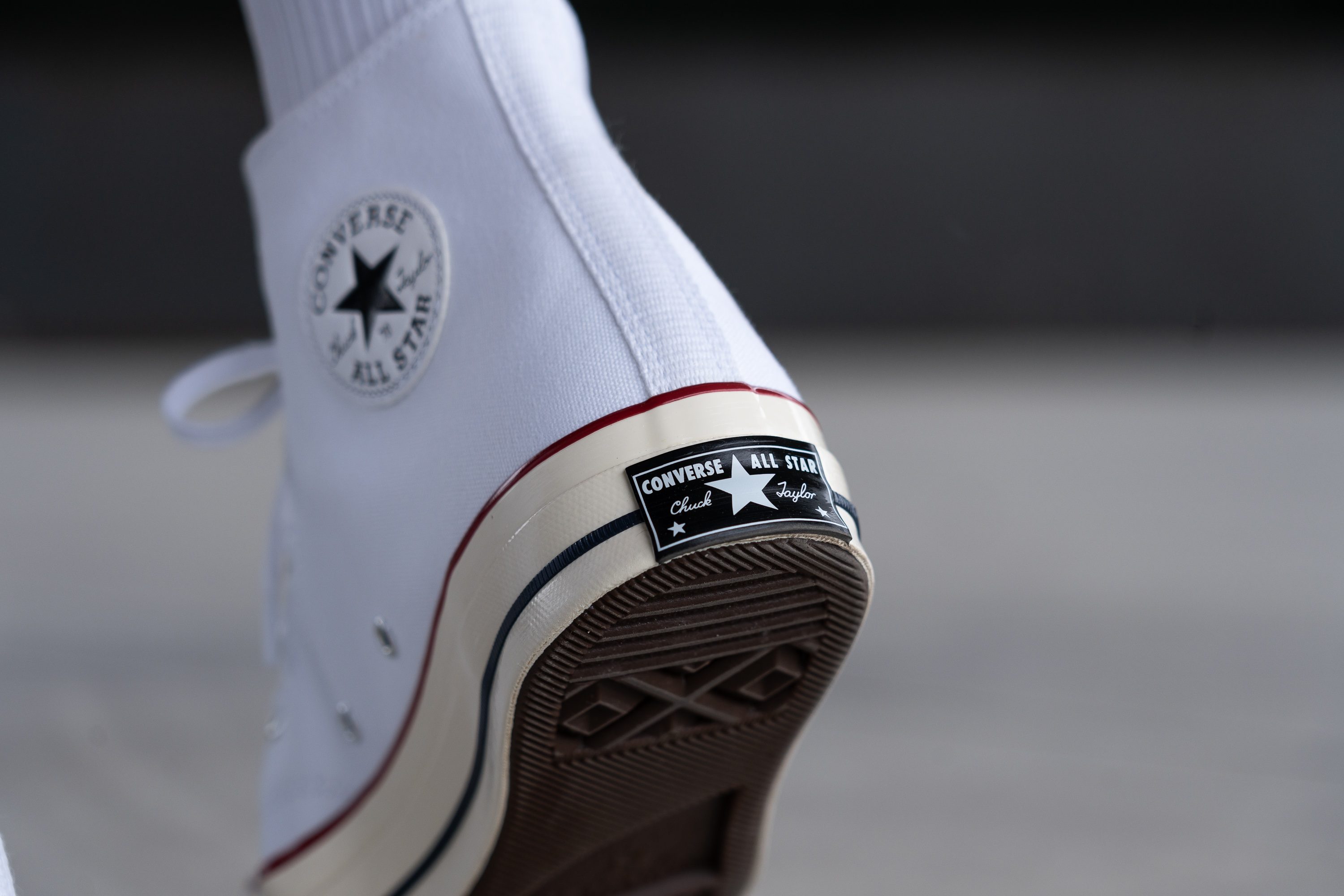
The sneaker got its name from a Converse salesman (Charles Taylor) who was also a semi-professional basketball player and coach. Back in 1922, he suggested several improvements that helped to make the shoe more flexible and supportive and consequently, more popular among basketball players at the time.
That's when the Converse Chucks also received its signature All-Star circular patch on the ankle.
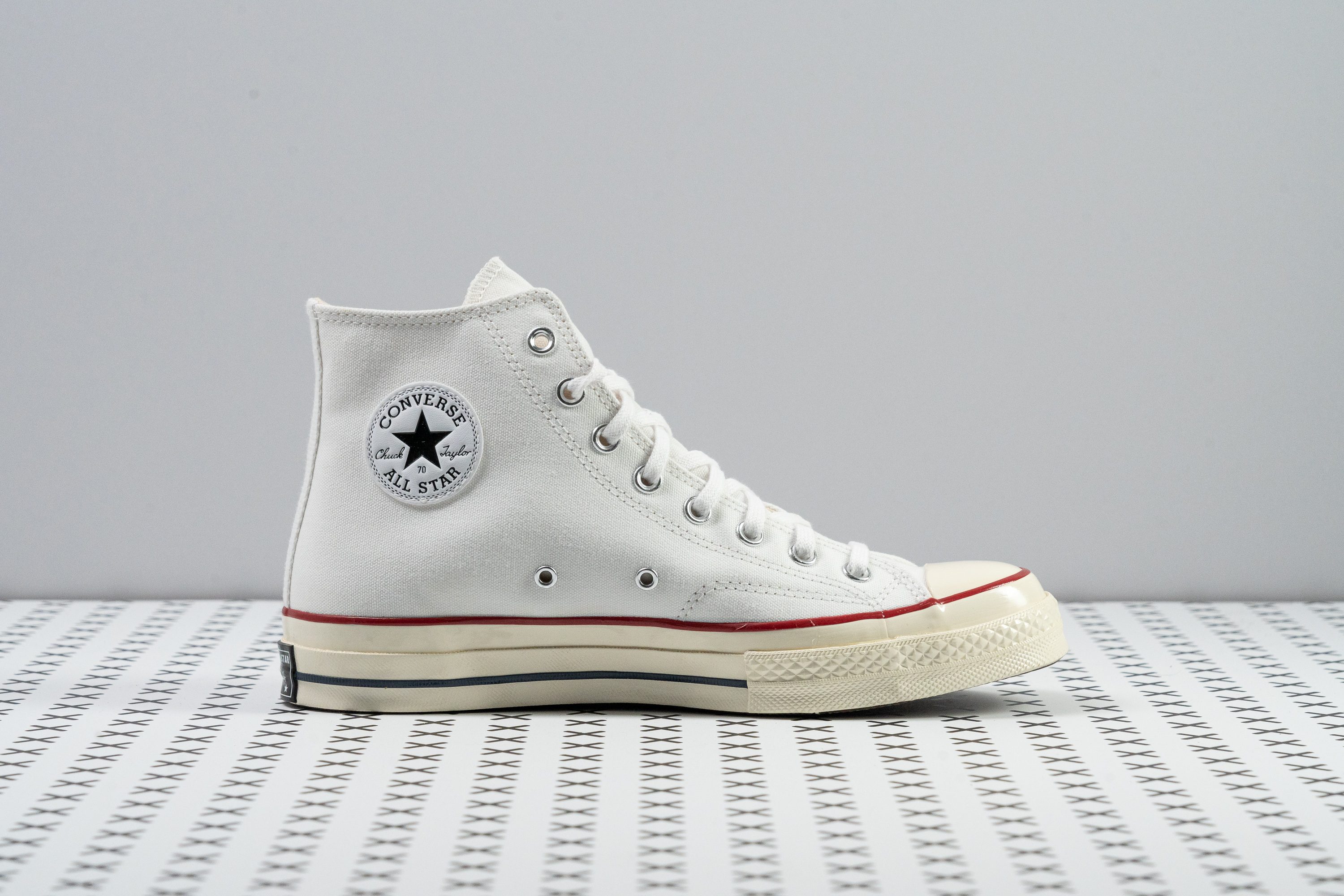
As a basketball shoe, the Chuck Taylor All-Star took up about 70-80% of the market by the '60s. After declining in popularity, it was reintroduced as a retro lifestyle sneaker in the '80s.
This Converse silhouette is now considered an icon among musicians, artists, subcultures, celebrities, and ordinary people alike.
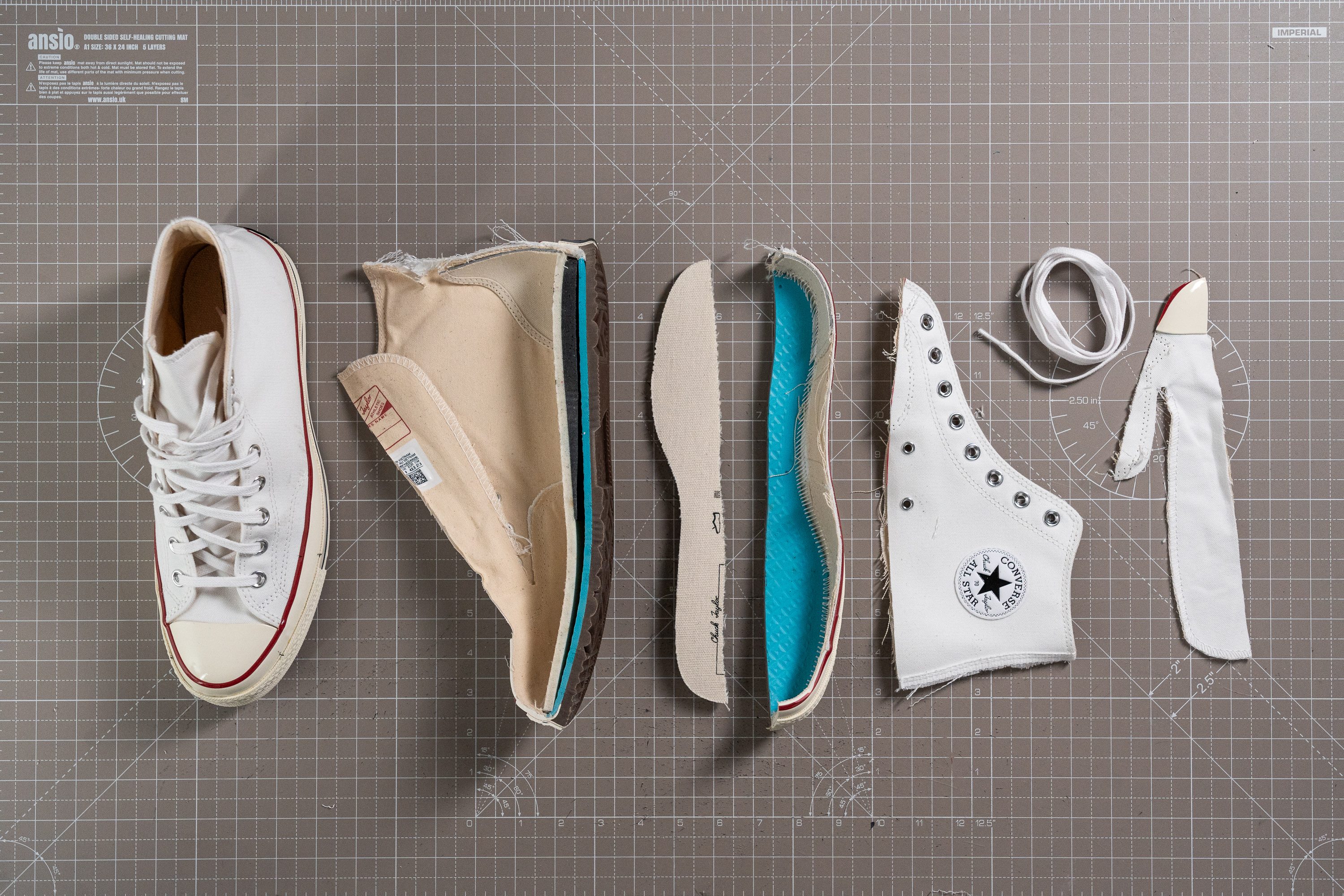
Chuck 70 vs. Chuck Taylor All Star
In this lab review, we tested the updated version of the sneaker called the Converse Chuck 70.
Released in 2013, it comes with a slightly higher price tag (+$25) but offers several welcome updates to the silhouette:
- thicker canvas upper
- higher rubber midsole and foxing
- thicker and more comfortable OrthoLite insole
- smaller toe cap
- extra material behind the toe cap for reinforcement
- one-piece rubber bottom sole (versus the three-piece sole)
- stitched-on circular logo (as opposed to the printed one)
- modernized black heel patch (versus the old-fashioned white one)
- glossier sole (as opposed to the matte one)
